#this might be a significant moral failing on my part but i just cannot see the problem
Text
this might just be because i am deeply, deeply terrified of The Vast Depths Of The Ocean, but i just cannot get myself up in arms about the whole "grave desecration" part of titanic tourism.
it is in fact significantly more comforting for me to imagine my hypothetical watery grave as somewhere people are constantly dropping in at all times than one where i am left to rest in cold, black, unfathomably desolate peace for all of eternity. cold, black, unfathomable desolation is precisely where the "nightmare" part of this nightmare scenario comes in for me, after all.
so yes, if you happen across my sunken bones, you all have my full permission to haul them back up to land. i don't care how much damage the oxygen and change in pressure is going to do to them and their archaeological value, just get me out of there.
#i acknowledge the anthropocentrism of this#but i feel like we can give my amygdala a pass on the self-centredness of its primal fears#this all being said#i fully respect it if grieving family members don't want people treating a location of great pain to them#as a fun tourist outing#the edmund fitzgerald is very much in living memory#for example#but like#the titanic is not#we're at a point where no one who personally knew anyone who died on the titanic is alive anymore#also we are constantly digging up wwi corpses and then sending them back to their country for proper military burial#when they've been identified#so like#this might be a significant moral failing on my part but i just cannot see the problem#anyway these oceangate folks really saw me fall back into one of my periodic Titanic Phases a few weeks ago#and said 'hey wouldn't it be fun if we kicked that morbid fascination up a notch or ten'#if it sounds like i am making light of this situation it is because this is very literally the nightmare scenario#the kursk sank when i was 10 and left its psychological fucking mark on me#not to mention the fateful fucking day i learned about tsunamis#horrifying#all of it#there is not enough money in the world to get me to go up into space or down into the depths of the ocean
29 notes
·
View notes
Text
Things I’m noticing on this rewatch, which I’m hoping to take slow and ponder on but we will see how it goes, PART FOUR (obviously major Good Omens season 2 spoilers throughout, specifically for S2E4)
- Lesi?
- Shax really does have creepy down pat.
- Aziraphale not sensing her, though. They really do play Calvinball with the rules of that, it seems.
- “You don’t seem his type at all” mirroring “I am so not your type” between Nina and Maggie last episode ;A; “you have no idea,” Maggie said. Aziraphale thinks. I weep.
- Sometime in the last 18, 19 years…would that have put them square in the “raising the Antichrist” years? Hang on. 4 years past the failed apocalypse…makes it 14…they were working on it for 11 years…no, that would put them before that, wouldn’t it? Wtf is that timing, Shax?
- “This Angel Gabriel, who I’ve never heard of” = “who’s Morales?”
- Shax really is the kind of infernally clever that’s perfect for tripping Aziraphale up when he’s already flustered and panicked. Love to see them interact.
- Opening theme detail today: one of the headstones reads Jane Austen. Wonder if the headstones change every episode too?
- “Here lies the former shell of Beelzebub” reads another, and “here lies Adam” with some text I can’t make out. Went back to the beginning of the graveyard bit now and “Peter Paintball”, and of course, “Every day.” If anyone gets good eyes on the Adam headstone, y’all gotta let me know.
- This episode’s theater feature: Nazi Zombie Flesheaters, with a still of the Nazis from s1 still alive. Nice.
- Seems odd to call the episode “The Hitchhiker” when it seems the literal hitchhiking is done by the time the opening credits roll. Time to refresh myself on why this episode might be called that.
- Did they reuse footage? Or reenact it?
- Yknow…none of the demons are wearing obvious animals this season. I think only Beelzebub, Hastur, and Ligur might have done it tbh.
- I love the details of Hell tbh. The fire cooler. The sheer number of Nazis. The way Shax moves so mechanically but so cool and collected.
- Does Shax actually have any higher demon ears? Or is she baiting Furfur? Hard to tell for her.
- Yknow the teeth aren’t helping in figuring out if Shax has an animal aspect.
- The besotted Aziraphale bit here. I cannot BELIEVE this all happens immediately post church bomb.
- Okay but the Nazis not disputing the fact that they belong in hell, just that they’re dead based on trickery. Nice.
- The tongue bit. Yuck.
- OKAY. Crowley has present day hair color for this adventure. That feels significant. Is this minisode a flashback?
- Okay the signage of Hell. Always a favorite. But the “heaven looks down on you” sign. Hmm. Bit odd.
- Ah. Because I couldn’t see the bottom half of it. “Because you’re…” something. Move it, Furfur XD
- Pathetic. “Heaven looks down on you because you’re pathetic.” …hmm. Still an interesting take, tbh.
- Happy to be in the probable minority that likes the zombies bit XD which is interesting bc I normally hate zombie fiction. They do it the way I like, though. They’re conscious and sentient in their zombieness.
- Also the brain repeating on him XD what a gloriously stupid and delightful detail
- And okay yeah the dead rising from the grave thing from Jimbriel’s prophecy and the Nazi zombies here feels like a big ole clue for s3. I’m Mormon so my upbringing around the Second Coming is probably weirder than other Christians but a big part of it for us is the emphasis on the resurrection of the dead, ALL the dead. Putting a properly macabre spin on it feels like a very Good Omens thing to do tbh.
- There’s the dirty donkey again! It DIDNT move, Crowley LITERALLY planned his heist ACROSS THE STREET FROM THE BOOKSHOP. I WORK IN SOHO I HEAR THINGS INDEED.
- David Tennant what is that voice XD
- Lots of emphasis on sleight of hand this…entire show :P it does make one suspicious of The Final Fifteen Minutes. But also I don’t want to rob them of their power? Because damn. DAMN.
- (The lip reading. It. I. I will wait for the end but GUH)
- He’s so pleased with himself for getting it right XD
- They are SO. IN. LOVE. KILL ME.
- Natural dexterity. Like the magic words, I’m waiting for that one to come true.
- The way Pat tries to have some integrity XD
- THE WAY AZIRAPHALE CASUALLY DROPS THAT HE HAS BOTH A FIREARMS LICENSE AND A DERRINGER. AZIRAPHALE ZIRAPHALE FELL, ARE YOU POSITIVE CROWLEY IS THE JAMES BOND ENTHUSIAST?
- More importantly, does he still have that???
- …does that mean Aziraphale’s fired a gun when Crowley hasn’t? What does this mean for the paintball gun bit? Does your derringer lend weight to a moral argument, Aziraphale??
- Hang on have to squeal for the way Aziraphale just grabs Crowley’s hand in both of his. So excited. So cute.
- HA, the wrong ring XD
- Sad to see Pat get eaten. But the framing of it is really cool actually.
- Fell the Marvelous. That poster. How in the heck.
- Aziraphale having stage fright tho.
- Jiggery pokery indeed XD
- EXPERIENCE USING FIREARMS. AZIRAPHALE THESE ARE SOLDIERS.
- Omg the miracle blocker is a punch card. The worldbuilding implications.
- I wonder at how hell would have taken Aziraphale handing Crowley a rifle tbh.
- “Aim for my mouth, shoot past my ear” WHAT DOES THAT MEAN
- the way they’re both shaking and nervous. The camera itself shaking. CROWLEY shaking
- The feather boa. I WEEP. He’s so happy.
- I know the implication is that Crowley, like Jim, is missing his memories, but. Also. The idea that maybe Crowley is just terrible at remembering people who aren’t Aziraphale. Poor Furfur.
- The sleight of hand is very subtle. Which is the point. But also. Idk man people have said it better and apparently written 16k essays about it, I’m just proud of him for pulling it off.
- Okay but. But they’re zombies. Neil they’re zombies. Aziraphale and Crowley just let three Nazi zombies wander off Neil. NEIL. WHAT IS THE PLAN WITH THEM??
- Dagon is in top form this season tbh
- I CANNOT BELIEVE. THAT THE ONE NAZI REALLY CAN READ LIPS. I CANNOT BELIEVE IT. Peak comedy always.
- I got it right the time that mattered ;A;
- I knew you would come through for me. You always do.
- You said trust me.
- And you did.
- MURDER ME.
- ITS CHATEAUNEUF DU PAPE AGAIN ARE YOU KIDDING ME I AM ALREADY TRYING SO HARD NOT TO QUOTE THIS SCENE WORD FOR HECKING WORD
- “If you were truly as evil as you like to paint yourself” the levels of deep seated misunderstanding and flawed foundational concepts I’m CRY
- Though it’s AZIRAPHALE who brings up shades of grey. A glimmer of hope.
- Can someone who knows accents tell me what is going on with Shax’s
- Beelzebub’s thanks and “good work” as a discordant note, but also their command for Shax to take an army to attack the bookshop knowing full well she isn’t going to get that kind of support…wut.
- THE BENTLEY FOLLOWING AZIRAPHALE AFTER HE PATS IT. CROWLEY FEELS WHAT IT FEELS.
- Peter Anderson’s screen effects are my favorite thing.
- Hate to see the way Nina is so broken down by Lindsey tbh.
- Yeeeah…Crowley seems to be purposely living in his car tbh. Retreating directly to it. I can’t tell if Aziraphale never thought to offer cohabitation or if Crowley turned him down but my money is on they’ve never discussed it despite both of them thinking about it very loudly.
- A night to remember! Never bodes well.
Okay. That’s it for tonight. An episode that seems out of place but has many good tasty morsels and I think more than a smidge of s3 foreshadowing. Why is the episode called The Hitchhiker? Maybe for Furfur trying to climb the greasy pole of bureaucracy? For the Nazis hanging onto life? Literally just for the one part at the beginning that sets the whole climax into motion? Who knows???
#good omens#good omens 2#good omens season 2#gos2spoilers#good omens 2 spoilers#good omens season 2 spoilers#ugh okay brain is officially mush#this episode is fun but I think its utility is more meta than narrative tbh
21 notes
·
View notes
Text
I came here from the Game of Thrones fandom, the “it was just like that back then in ye olden times” excuse was ridiculous there, and it’s especially ridiculous as an excuse to justify something that is clearly framed as NOT justifiable by the show in a fantasy world. As much as ATLA takes inspiration from Asian cultures, it is not a historical show.
But even if we look at what was considered culturally acceptable in the Fire Nation, what Ozai did to Zuko isn’t justifiable. Not that it matters in any case, but what Ozai does is not even reasonable by any rules of agni kais that we might get from what little canon says about it and historical influences that we might use as examples. The fact that we have so little given to us in canon makes the “oh, it was culturally acceptable” thing rather silly at best because we don’t know what was considered culturally acceptable. At worst it’s rather racist to be like “that’s just how their culture is, oh those brutal and primitive nonwhites,” especially when it is specifically established in the series that the roots of Fire Nation culture from which the agni kai originated are NOT the war-mongering military-obsessed values that the FN embraced after Sozin.
Even if we took the agni kai between Zuko and Ozai at face value, there are a number of things about it that immediately make it an unfair fight. Zuko himself tells his father “how can you possibly justify a duel with a child,” and that it was cruel and wrong. Zuko was thirteen years old. And since Zuko specifically mentions his age when he tells Ozai it was wrong, I think we can say that we would not be remiss in imposing modern standards. There’s no evidence that ritualistic duels between children and adults would be considered normal. It may have been accepted because Ozai was the Fire Lord, but I’m sure there were plenty of people, even people who witnessed it, like Iroh, who thought fighting a child was despicable but maybe wouldn’t say anything to go against the Fire Lord.
We do know that an Agni Kai carries spiritual and cultural significance, and we also know from “Winter Solstice” that not all of the Fire Sages, the religious authorities in the Fire Nation, were down with the way Sozin ran things. It is made explicit in the series that Ozai and his ancestors were responsible for creating a spiritual imbalance in the world, so I think it can also be assumed that what we see of the agni kai ritual in the series itself is a twisted version of what it was originally intended to be. The wiki says that before Sozin’s rule, agni kais were rarely fought to the death, but that changed after Sozin’s regime and the emphasis on mercy and compassion being seen as weakness.
In addition to the fact that Zuko was a child when he was challenged by Ozai, I think it also goes without saying that the fact that Ozai is Zuko’s father as well as the Fire Lord means that there is a huge power imbalance there. This isn’t a duel between equals. Let’s look at what the wiki says about the agni kai ritual:
Any firebender may participate in an Agni Kai. Fire Lords can also be challenged, but that rarely occurs, as most Fire Lords are among the most powerful firebenders in the world.
I hear you saying “but sokkastyles, it says any firebender can participate and surely that means that children can fight duels with adults!” To which I say, common sense is your friend, please get to know it.
What I wanted to draw your attention to, though, is the statement that Fire Lords are rarely challenged to agni kais because they are among the most powerful in the world. Makes sense, right? It’d be pretty stupid to challenge the most powerful firebender alive to a firebender duel, unless you were pretty sure of your abilities. That doesn’t prohibit the Fire Lord from challenging others or fighting in the place of someone else, but it does ensure a pretty unbalanced fight. Which brings me to the next point, which was that Zuko did not even know he was fighting the Fire Lord. I think a lot of people forget this but it’s a key detail in whether or not you can consider this to be a legally or culturally justifiable fight. Even if you consider Zuko able to fully consent as a thirteen year old to fighting against an adult, against the Fire Lord, against his father, Zuko very obviously cannot knowingly consent to fighting someone that he didn’t even know he was fighting until the last moment, when it was too late to back down.
I’ve also seen people say that Ozai only burned Zuko because Zuko refused to fight, but here’s the thing. Given what I just outlined, Zuko was put in a situation that he could not reasonably consent to, that he obviously could not win, and then is punished for backing down. This is not a mere cultural ritual. This is Ozai deliberately manipulating the situation so that no matter what Zuko did, he would get hurt. And I don’t for a minute believe that Zuko would be spared if he had chosen to fight. If Zuko had chosen to fight, he would most likely have been cast as disloyal, the kind of disloyal son who would attack his father, and quickly defeated, and Ozai probably would have branded him as a result of his dishonor just the same. As it is, Ozai exerts his will against an adolescent who is begging and crying on the ground in front of him.
The wiki also says that a challenge has to be accepted, and we don’t see Zuko accept the challenge in the flashback, but even if he did, he was accepting it without the full knowledge of who he would be fighting, which renders his ability to accept moot if we go by most people’s understanding of legal consent (and, again, children cannot legally consent in any case, but anyway). Once he does see who he is fighting, he immediately tries to back out of it, but by then it isn’t an option. If Zuko isn’t given an option to decline then he can’t actually meaningfully accept the challenge.
Here’s another interesting tidbit from the wiki:
The Agni Kai is an ancient Fire Nation tradition. Fire duels have been fought for hundreds of years. However, such a duel is a grave matter, meant to be a last resort when all else fails or is insufficient to settle a dispute.
Did Ozai fight his son to settle a dispute? Was it a last resort, after other means of peaceful resolution had failed? I’m not gonna debate about whether a teenager speaking out during an important meeting justifies a duel or if burning a child’s face is an acceptable form of corporeal punishment. I think even by the rules of hypermasculine fantasy violence this would be considered a disproportionate response. My purpose is to point out that even by the established rules of hypermasculine fantasy fire land, it still would be considered a gross abuse of the system. Even the people on Zuko’s crew, who are all Fire Nation military, are shocked to hear the story. Jee says he assumed that Zuko was in a training accident and is nicer and more sympathetic to Zuko after learning how Zuko was scarred. Which would not be the case if the narrative that Ozai spins about Zuko losing his honor and being disrespectful and thus deserving to be burned were universally culturally accepted as true. I think there were enough people who thought it was, the Zhaos who bought into the fascist regime and glorification of violence. And yes, learning that it wasn’t justified was part of Zuko unlearning all the fascist BS his nation had been indoctrinated with, but it’s also made clear that Ozai wasn’t just acting within the rules of his society and that Zuko had to unlearn a lot of psychological conditioning due to his father’s abuse, and that included the idea that he deserved to be hurt. Ozai uses fascist values to justify hurting Zuko but what lies behind it is Ozai’s desire to use his power to hurt his son, and abusive people will frequently find ways of justifying their actions, by whatever means.
It’s also funny that people who bend over backwards to justify Ozai attacking a crying, surrendering child (from any direction, legally, morally, culturally, I don’t care) are often the same people who claim that Zuko was somehow taking advantage of Azula by fighting her when she was unstable and would have tried to kill him and harm others regardless of whether he had accepted her challenge.
141 notes
·
View notes
Text
Penny and Winter as Symbolic Human Machines
So honestly, I’m really impressed by how well done the ending of RWBY Volume 8 was with regard to character arcs being fulfilled, especially for Penny and Winter. I’ve seen a lot of takes, some that I somewhat agree with, and some that I just don’t, that Penny’s death was “bad writing,” and I think that, subjectivity of what constitutes bad writing aside, this is ignoring a lot of aspects of V7/V8 that made for a very compelling narrative, and feels heavily based in just people wanting Penny to not have died.
And I get this! Penny is one of my favorite characters and I’m very sad that she died; however, I really actually loved how fitting her death was for her story and the broader story of RWBY as a whole, so I wanted to do a write-up of my whole rant on this so that people could read it and see my thought process for why this only made me love Penny’s writing more. I’m not necessarily going to ascribe value to the writing itself in this analysis, as that is highly subjective, but I am biased so that’ll shine through some.
V7 through V8 had a lot of moments that frankly I hadn’t picked up on right up until the end that worked to build a dynamic interplay between Penny and Winter’s characters. Specifically, Penny's role is of a literal robot becoming less of a machine in the thematic sense and more of a person throughout, contrasting with Winter, who, while she is helping Penny realize herself as more of a person and less of a tool, is going through the opposite experience herself.
This is essentially textual - it’s explicitly said by Winter herself in less words during the Maiden power transfer scene in V8E14.
When we as the audience reconnect with Winter at the start of V7, she is firmly entrenched as Ironwood’s confidante and second-in-command, serving as a face of the Atlas military as it squeezes Mantle. It’s safe to say that not many Mantle citizens like her very much, but she is insulated from this and continues to follow orders without regard for the welfare of the people. Ironwood at this point is already extremely authoritarian, even though he hasn’t graduated to full on dictatorship and declared martial law yet, and his will is also imposed on her through bringing her into the fold with the chief purpose of grooming (god this word feels grossly fitting given their dynamic) her to become the next Winter Maiden.
Winter, despite holding a a significant level of power and authority due to her military rank, has very little agency in this decision. She insists that her choice to take up the duty as Ironwood ordered is something she’s grown into and chosen, but it’s alarmingly clear that this is not the case; nearly every action she takes in V7 is still fully in the purview of Atlas (read: Ironwood)’s goals. I would go so far as to suggest that Ironwood giving her this position within the military after she escapes her father’s influence is intentionally conditioning her to view him as the sole way out of an abusive situation, and to disguise the fact that this new situation is just as abusive as the first below the surface.
Penny’s role in V7 is completely in opposition to this; while she is still theoretically under the control of the Atlas military, she is presented as the Protector of Mantle and seems to be beloved by the people. Our immediate image of her in Atlas is one of emotion and caring; she is overjoyed to see her friends from Beacon again, and this continues throughout the volume as she talks about what it means to be a person with them, Ruby and Winter especially. When things start going wrong and she is accused of killing people through the doctored footage from the rally, she is horrified at the prospect of being seen as a monster and continues to make every decision with the aim of protecting everyone around her, even at the expense of what her “duty” to Atlas might be. It’s clear that she is growing into her own agency, rather than being beholden to what Ironwood wants for her, and this helps prove to herself that she is her own person, not simply a tool of the military, not a machine.
The climactic scene of V7 takes these two character arcs running in strained parallel and drives a wedge between them, even as they battle a common enemy side by side. Winter’s devotion to Atlas (read: Ironwood) results in self-destructive tendencies, uncaring for her personal survival if it would further a goal that she ultimately and ironically does not truly believe in. Penny, however, begins to entirely shake this duty, risking even the Maiden power going to Cinder if it means saving Winter from dying. To her, personal feelings (ding ding ding!) and personal friendships mean more than duty to a state, or even (as we see later) her own well-being. Self destructive tendencies aside, this loyalty to people she earnestly cares about, who earnestly care about her, is loaded with symbolism that separates her from the metaphor of machine.
The result of the V7 finale reinforces the track the two of them are on; Winter, having been molded into a machine of the military, fails in her duty, while Penny, who has begun to recognize herself more and more as a person, succeeds at keeping the power from Cinder. She still has a massive amount of self-doubt and deep-seated fear that she doesn’t count as a person, but the Maiden power, being the perfect thematic symbol of “maidenhood”, goes to her, proving her to be a “real girl” and reinforcing the ongoing narrative. Winter, battling her own mixed feelings over being chosen for the power, never questions this; it’s clear that she, too, recognizes that Penny “was always the real Maiden, while [she] was the machine.” This also reinforces Penny’s narrative being heavily trans-coded, but I think that’s pretty obvious and doesn’t need to be reiterated. The two of them part sides here, one remaining with the Atlas military and one actively rebelling against it.
As Ironwood starts going off the deep end at the end of V7 and throughout V8 and starts sacrificing everyone around him to fuel his own narrow and tyrannical view of how to save Atlas, Winter simply...falls in line. She is continually forced to follow harsher and harsher orders, and any choices she makes as part of that, with only two exceptions, still are entirely in service to Ironwood. She has become, in essence, a machine locked into a set path, a path she, conflicted as she may be, follows all the way up to a choice she cannot abide - mass murder. Even orders that would result in her sister’s closest friends’ deaths she follows unquestioningly - it’s unclear whether she would have actually gone through with it, since the option is taken off the table by forces outside her control, but she certainly says as much in her conversation with Marrow. Only the prospect of annihilating the entire city of Mantle finally snaps her off the track Ironwood has set her on, making her recognize that all of this has never been for Atlas at all, but for Ironwood’s own ego. Fittingly, finally seeing Ironwood as her enemy and not a savior, she is tasked with taking him down herself.
Contrasting this, Penny’s role in V8 is entirely one of rebellion. The entire volume is her building her agency more and more, making decisions based on what she thinks is right and what she values. She rarely listens to any one person telling her what to do; even her father, who she loves dearly, isn’t able to make her do something when her sense of justice is on the line. Ironwood no longer has his hold on her for the most part; any attempt at manipulating her into doing something against her own morals is met with defiance, supported by her friends’ love for her. She has to be outright hacked to be forced into doing his bidding, and she fights this all the way down, her own inherent personhood pushing back against this attempt to dehumanize her. In this sense, even her becoming organic symbolizes this; she and the people she cares about defy this dehumanization of her, finding a way to free her from the last remaining vestiges of Atlesian influence and further reclaiming her own agency.
And what does she do with that agency when she is faced with oblivion? She simultaneously affirms it by making her final choice in a desperate situation, defying Cinder’s attempt to rip her power away, and also gifts it in the form of the Maiden power to the woman who she is watching attempting to also shake the shackles of Atlas, symbolically showing Winter her own inherent humanity. This decision, though dire, is in recognition of what is most important to her: her friends. Even believing half of them are dead, she gives up her life to ensure the rest survive. In the final moment she has with Winter, she reassures her that she won’t be really gone: the memory of her choice and who she is as a person will live on through Winter’s continued choices, through her agency.
In the end, neither of them were machines; just two hurt people fighting back against a brutal world that sought to strip their agency away. The tragedy in this conclusion, that that brutal world took one of their lives away, is fought just as defiantly. Penny knows that gifting the power in her soul to Winter means that her death won’t be meaningless, that her agency will last beyond her mortality and might result in the world finally being freed from the threat of destruction. It’s because of hope, not despair, that she makes her final choice.
#rwby spoilers#rwby8 spoilers#my writing#CRITICAL ANALYSIS TIME#i've been meaning to write up my rant on this for months#rwby#winter schnee#penny polendina
140 notes
·
View notes
Text
RWBY Recaps: Volume 8 “Dark”
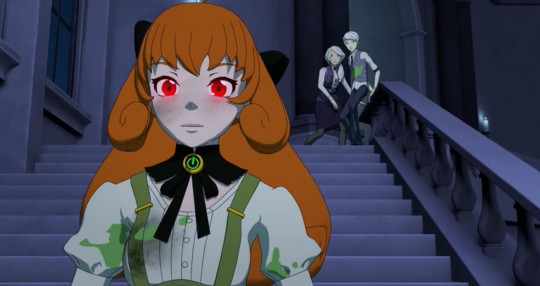
Welcome back, everyone! Can you believe it's been six weeks already? I can't. Something something the uncomfortable passage of time during a pandemic as emphasized by a web-series.
But we're here to talk about RWBY the fictional story, not RWBY the cultural icon. At least, we will in a moment. First, I'd like to acknowledge that shaky line between the two, growing blurrier with every volume. A sort of good news, bad news situation.
The bad news — to get that out of the way — is that we cannot easily separate RWBY from its authors and those authors have, sadly, been drawing a lot of negative attention as of late. This isn't anything new, not at all, but I think the unexpectedly long hiatus gave a lot of fans (myself included) the chance to think about Rooster Teeth's failings without getting distracted by their biggest and brightest production. There's a laundry list of problems here — everything from the behavior of voice actors to the quality of their merch — but as a sort of summary issue, I'd like to highlight the reviews that continue to pop up on websites like Glassdoor, detailing the toxic, sexist, crunch-obsessed environment that RT employees are forced to work in. A lot of these websites requires a login to read more than a page of reviews, but you can check out a Twitter thread about it here.
Now, I want to be clear: I'm not bringing this up as a way to shame anyone enjoying RWBY. This isn't a simplistic claim of, "The authors are Problematic™ and therefore you can't like the stuff they produce." Nor is this meant to be a catch-all excuse for RWBY's problems. If it were, I'd have dropped these recaps years ago. I'm of the belief that audiences maintain the right to both praise and criticize the work they're given, regardless of the context in which that work was produced. At the end of the day, RT has presented RWBY as a finished product and, more than that, presents it as an excellent product, one worth both our emotional investment and our money (whether in the form of paying for a First account, or encouraging us to buy merch, attend cons, etc.) I'll continue to critique RWBY as needed, but I a) wanted fans to be at least peripherally aware of these issues and b) clarify that my use of "RT" in statements like, "I can't believe RT is screwing up this badly" is meant to be a broad, nebulas acknowledgement that someone in the company is screwing up, either creatively (doesn't have the skill to write a good scene) or morally (hasn't created an environment in which other creators are capable of crafting a good scene). The real, inner workings of such companies are mostly a secret to their audiences and thus it's near impossible for someone like me — random fan writing these for fun as a casual side hobby — to accurately point fingers. Hence, broad "RT." I just wanted to clarify that when I use this it's as a necessary placeholder for whoever is actually responsible, not a damnation of the overworked animator breaking down in a bathroom. Heavy stuff, but I thought it was necessary (or at least worthwhile) to acknowledge this issue as we head into the second half of the volume.
Now for the good news: RWBY has reached 100 episodes! For any who may not know, 100 is a pretty significant number in the TV world because, when talking about prime time programming, it guarantees syndicated reruns. Basically, networks don't want audiences to get burned out with a show — changing the channel when it comes on because ugh, I've seen this already, recently too — and 100 episodes allows for a roughly five month run without any repeats, making it very profitable. RWBY is obviously not a television show and doesn't benefit from any of this (hell, modern television doesn't benefit from this as much as it used to, not in the age of streaming), but the 100 episode threshold is still ingrained in American culture. Beyond just being a nice, rounded number, it is historically a measure of huge success and I can't imagine that RT isn't aware of that. Regardless of what we think of RWBY's current quality, this is one hell of a milestone and should be applauded.
All that being said... RWBY's quality is definitely still lacking lol.
Our 100th episode is titled "Dark" — keeping with the one word titles, then — and I'd like to emphasize that, as a 100th episode, it definitely delivers in terms of plot. There's plenty of action, important character beats, and at least one major reveal, everything we'd expect from a milestone and a Part II premiere. The animation also continues to be noteworthy for its beauty, as I found myself admiring many of the screenshots I took for this recap. There are certainly things to praise. The only problem (one we're all familiar with by now) is that these small successes are situated within a narrative that's otherwise falling apart. It's all good stuff... provided you ignore literally everything else surrounding it.
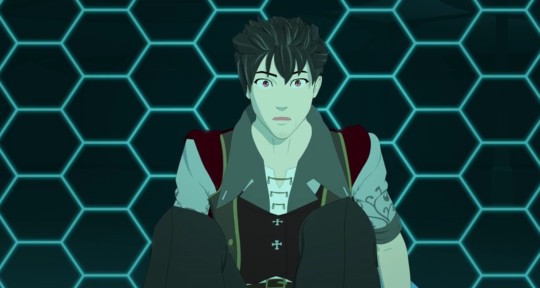
But let's dive into some examples. We open on Qrow starting, awoken by the thunder outside. Robyn has been watching him and makes a peppy comment about how none of them will be sleeping tonight, followed by a more serious, "Sounds bad out there." Yeah, it does sound bad, especially when they all know — thanks to Ruby's message back in Volume 7 — that this is due to Salem's arrival. I think a lot of the fandom has forgotten that little detail because people often discuss Qrow as if he is entirely ignorant of what is going on outside his cell. Even if we were to assume that he's forgotten all about the pesky Salem issue (the horror of Clover's death overriding everything else, perhaps) he still knows that Tyrian is running loose in a heat-less city with a creepy storm going on and, from his perspective, the Very Evil Ironwood is still running the show. So it's bad, which begs the question of why Qrow (and Robyn, for that matter) hasn't displayed an ounce of legitimate worry for everyone he knows out there. Thus far, their interactions have centered entirely around Qrow's misplaced blame and Robyn's terrible attempts to lighten the mood, despite the fact that a war is raging right beyond that wall. It's another example of RWBY's inability to manage tone properly, to say nothing of balancing the multiple concerns any one character should be trying to juggle. Just as it rankles that Ruby and Yang don't seem to care about what has happened to their uncle, Qrow likewise doesn't seem to care about what might be happening to his nieces. When did we reach a point where these relationships are so broken that someone can be arrested/chucked into a deadly battle and the others just... ignore that?
So Robyn's otherwise innocuous comment immediately reminds me of how badly the narrative has treated these conflicts and, sadly, things don't improve much from here. We are thankfully spared more of Robyn's jokes when Qrow realizes that what he's hearing can't be thunder. A second later, Cinder blasts through the wall — called it! — and Qrow instinctively transforms.
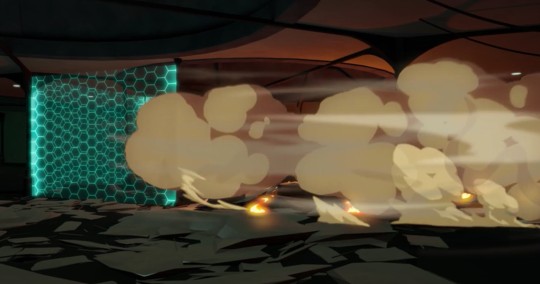
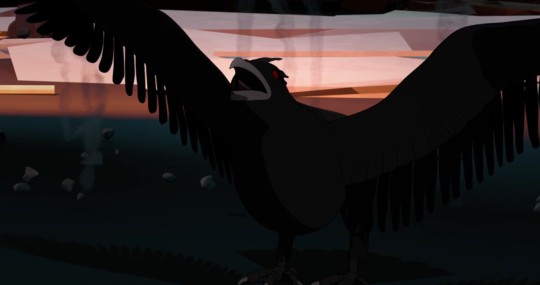
The only downside to this moment is that the whole ceiling falls down on Qrow and the others because APPARENTLY these cells don't have tops on them. Seriously. As far as I can recall we don't see the stone breaking through the forcefield somehow and this looks pretty open to me.
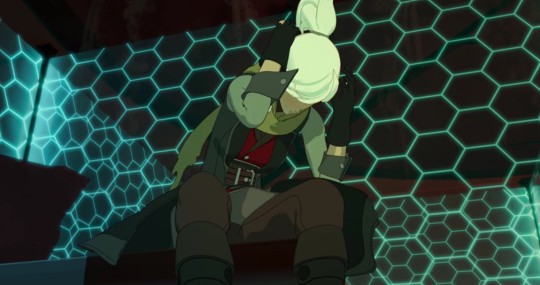
If it is... you're telling me these crazy powerful fighters who practice landing strategies and leap tall buildings in a single bound —
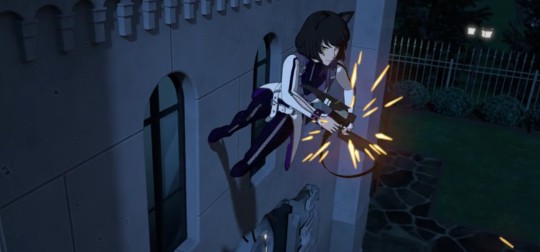
— can't just hop over this mildly high electric fence to get out? Qrow can't just fly away?
We're, like, two minutes in, folks.
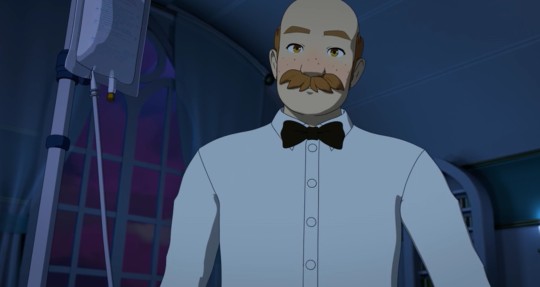
We transfer to Nora's perspective as she wakes up, seeing Klein giving her the IV. He tells her not to worry, that "you and your friend are going to be just fine." What friend? Penny? Klein went upstairs prior to Weiss hugging Whitley or Penny crash landing outside. I had thought them bursting through the door with another unconscious friend was the first time he learned what the big bang outside was, but apparently not.
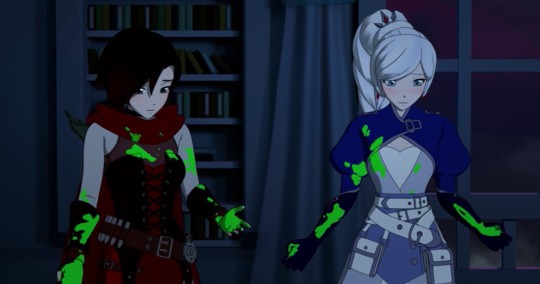
Penny is, obviously, a mess. While I now understand the choice to make her blood such an eye-catching color when that's crucial to the Hound's hunt, I still think it looks strange visually. Like someone has taken a copy of RWBY and painted over it. It doesn't look like it fits the art style. More than that, it implies some rather complicated things about Penny's humanity, especially in a volume focused around her being a "real girl." Real enough for Maiden powers, but with obviously inhuman blood that isn't even referred to as "bleeding." Penny "leaks" instead.
Toss in the fact that she's literally an android who is made up of tech — recall the running gags about her being heavy, or it hurts to fist-bump her, to say nothing of keeping things like multiple blades inside her body — yet Klein says that her "basic anatomy" is the same and he can "stitch up that wound."
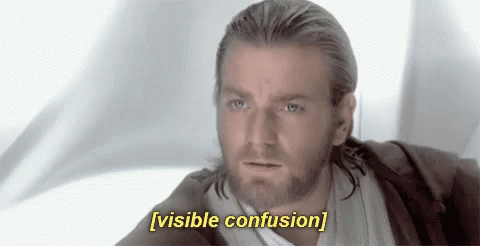
I'm sorry, what? Whatever Penny looks like on the inside, it's not going to resemble a human woman's anatomy, and Klein might be able to stitch the outer layer of skin she's got, but that won't do anything to fix whatever metal bits have been broken underneath. Penny isn't a human-robot hybrid, she's a robot with an aura. Penny has knives in her back, rockets in her feet, and a super computer behind her eyes. When our clip introduced that Klein would be the one to help Penny, my initial reaction was, "Seriously? He's a butler and a doctor and an engineer?" But RWBY didn't even try to get away with a Super Klein explanation, they just waved away Penny's very obvious, inhuman anatomy. Yeah, I'm sure "stitching up" an android wound is just like giving Nora her IV. I hope the surgical sutures he used are extra strong!
In an effort to not entirely drag this episode, I do appreciate that Whitley is allowed an "ugh" moment about the non-blood covering his shirt without anyone calling him out on it. That felt like the sort of thing the show would usually try to make a character feel guilty about and I'm glad that, for once, he was just allowed to be frustrated without comment.
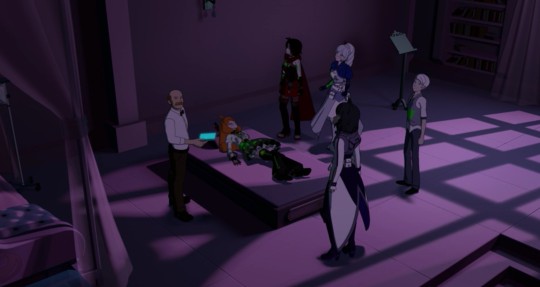
Then the power goes out and May calls, which raises questions about what state the CCTS is in and when scrolls are available to our protagonists vs. when they're not. But whatever. She's checking in because she just "saw another bombing run light up the Kingdom" and —
Wait. Bombing? Salem is bombing the city? I know we've seen explosions in the sky, but I'd always just attributed that to evil aesthetic. Why does this dialogue sound like it's from a World War II film and not a fantasy sci-fi show about literal monsters launching a ground attack?
May looks pretty against the sky though. I like her hair color against that purple.

I'm admittedly grasping at positives here because we finally return to her "You have to choose" ultimatum and — surprise! — May has pulled back completely. Ruby says that once they've helped Penny, "We'll...we'll do something!" which is once again her avoiding making a decision. Ruby still refuses to choose, instead falling back on generic, optimistic pep talks. They'll figure out how to stop Salem later. They'll think about the impact of telling the world later. They'll choose who to help later. Ruby keeps pushing these problems into the future where, she hopes, a perfect, magical solution will have appeared for her to latch onto. When that continues to not happen, others pressuring her to actually do something and stop waiting for perfection — Ironwood, Yang, May — she panics and continues stalling for time. Wait an episode and the narrative supports her in this.
Because initially May was forcing Ruby to decide. Now, May enables her desire to keep putting things off. "Don't beat yourself up, kid. At this point, I don't know how much is left to be done." That's the exact opposite of what May believed last episode, that there was still so much work and good to do for the people of Mantle. This is precisely what the show did with Yang and Ren's scenes too, having people call Ruby out... but then return to a message of, 'Don't worry, you're actually doing just fine' before Ruby is forced to actually change.
None of which even touches on May calling her "kid" in this moment. That continues to be a convenient way of absolving Ruby of any responsibility. When she wants to steal airships or Amity Tower, she's an adult everyone should listen to, the leader of this war. When the story wants to absolve her of previously mentioned flaws, she becomes a kid who shouldn't "beat herself up." I said years ago that RWBY couldn't continue to let the group be both children and adults simultaneously, yet here we are.
So that was a thoroughly disappointing scene. Ruby gets her moment to look sad and defeated, listing "the grimm, the crater, Nora, Penny" as problems she doesn't know how to solve. Note that 'Immortal witch attacking the city I've helped trap here' isn't included in that list. Ruby is still ignoring Salem herself and no one in the group is picking up where May left off, challenging her to do more than wring her hands over things others are already trying to take care of: Ironwood is fighting the grimm, May has gone off to help the crater, Klein is patching up Nora and Penny. Ruby, as one flawed individual, should not be expected to come up with a solution to everything, but she does need to stop acting like she can come up with a solution to everything when it matters most (office scene) and rejecting others' solutions when they ask for her help (Ironwood, May).
If it feels like I'm dragging the flawed, traumatized teenager too much, it's not in an effort to ignore those aspects of her identity. Rather, it's because she's also the licensed huntress who wrested control from a world leader and violently demanded she be put in charge of this battle. Ruby, by her own actions, is now responsible for dealing with these problems, or admitting she was wrong and letting others take the lead, without purposefully derailing their plans. She doesn't get to suddenly go, "I don't know," cry a little, and get sympathetic pats.
But of course that's precisely what happens, courtesy of Weiss.
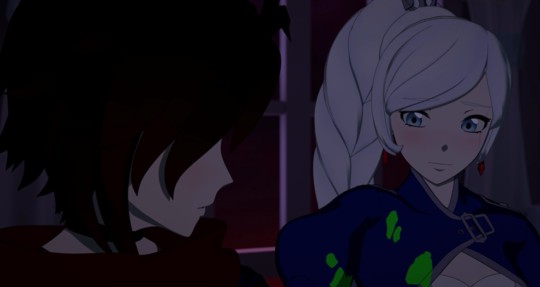
During this whole scene I kept wondering why no one was celebrating Nora waking up, especially when Ruby outright mentions her. Have they just not noticed given all the Penny drama? Because Nora absolutely woke up.
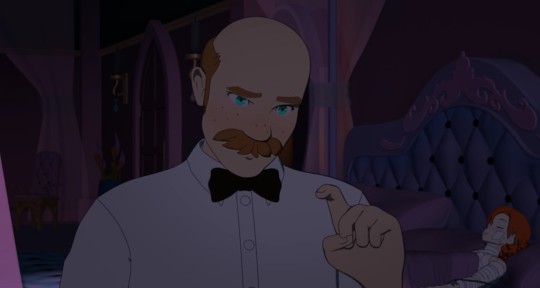
Aaaand went back to sleep, I guess. What was the point of that POV shot? No worries though, she'll wake up again in a minute.
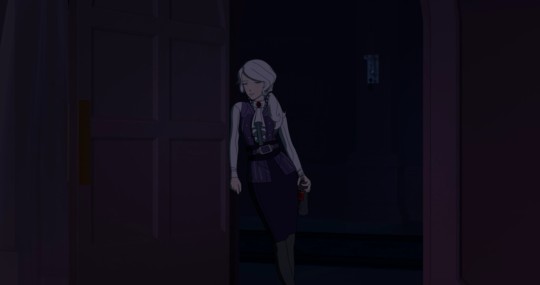
Willow arrives and announces that they can fix the power (and Penny) using the generator at the edge of the property. I'm convinced RT doesn't actually know what a generator is because the characters are acting like it's some super special device that only richy-rich could possibly have. Whitley says that it's the SDC executives who have their "own power supply" and that it's "extremely unfair." Now, don't get me wrong, a good generator powering large portions of your house can run you 30k+, but you can also get one that plugs into your extension cord and powers your fridge for a couple hundred. There's absolutely a class issue here, just not the one Whitley and Weiss seem to be commenting on. They make a generator sound like the sort of device that only a politician-CEO could possible have and it's weird.
Likely, it sounds weird because it's a choppy way of getting Whitley to bring up the wealth disparity so he can then go, 'That's right! We're crazy rich with a company housing tons of ships! We can use those to evacuate Mantle.' Awkwardness aside, I do like that the Schnee wealth is being used for good purposes, but... evacuate where? To the city currently under attack by a giant whale? In a RWBY that wasn't determined to demonize Ironwood, this would have been a great plot point during the office scene instead, with Weiss offering her services to Ironwood, even if the group decides that a continued evacuation still isn't possible.
Instead, we get it here from Whitley. Do I need to point out the obvious? That Whitley is the MVP of this episode? He's done more good in an HOUR than the group has managed in a year. Give this kid some training and make him a huntsmen instead.

We're given a (very pretty!) shot of the shattered moon because it wouldn't be RWBY if we weren't continually reminded that gods once wiped out humanity before destroying part of a celestial body... and absolutely no one talks about that lol.
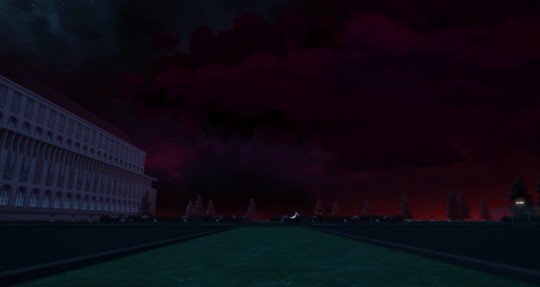
Blake's coat might not make any sense for her color scheme, but it does make her easy to spot as she and Ruby run across the grounds. Oh my god, they're actually doing something together! It only took eight years. They even get a lovely talk where Blake admits how much she looks up to Ruby, despite her being younger, and once again I'm struck at how much more I would have loved this scene if it had appeared elsewhere in the series. It is, indeed, as sweet and emotional as all the RWBY GIF-ers are claiming... provided you overlook that this is the exact opposite of what Ruby needs to hear right now. She doesn't need to hear that she's more mature and reliable than her elders when she's functioning under a "We don't need adults" mentality. She doesn't need to hear that not knowing what to do is totally fine, not when that led to her turning on Ironwood, despite not knowing how to stop Salem. She doesn't need to hear that "doing something" — doing anything — is a strength, because Ruby keeps avoiding the big problems for smaller ones she's comfortable with, like standing by Penny's bedside instead of deciding between Mantle and Atlas. Blake's speech is heartfelt, but it's a speech that suits a Beacon days Ruby who is having some doubts about her leadership skills, not the girl whose impulsive — and now lack of — actions is having world-wide repercussions. Everyone is babying Ruby to a staggering degree. It's like if we had a med show where the doctor is standing by the bedside of a coding patient, fretting between two treatments. 'Don't worry,' their colleague says, patting their shoulder. 'I've always looked up to you. You'll do something when you're ready' and then they continue to watch the patient, you know, die.
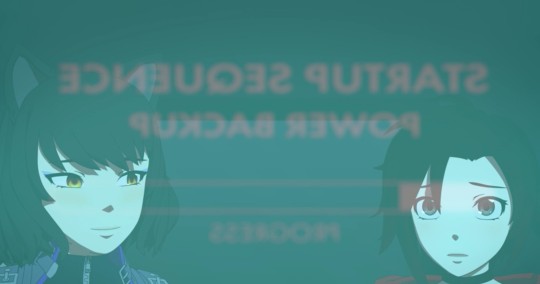
Also: who does Ruby look up to? Everyone talks about how much they depend on and trust Ruby, but who does Ruby look to for guidance? A number of her problems stem from the fact that she has rejected the advice of everyone who has tried to help her improve: Qrow, Ozpin, Ironwood, even Yang. Ruby is presented as the pinnacle of what to strive for in a leader, rather than a leader who has only been doing this for two years and still has a great deal to learn.
Anyway, they get the generator on and the Hound shows up.
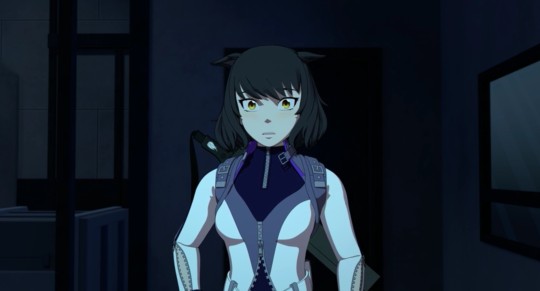
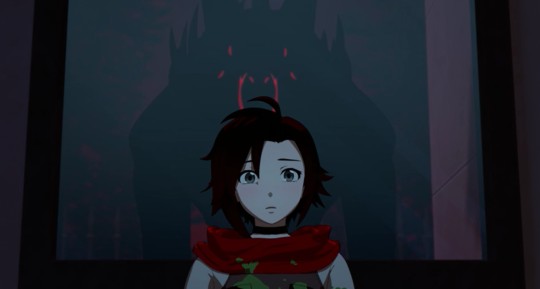
I am begging RT to just make RWBY a horror story. All their best scenes the last three years have been horror I am bEGGING —
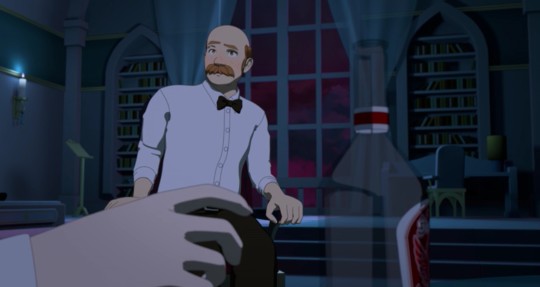
Anyway, while Ruby waits to be eaten we cut to Willow and Klein, the former of which is reaching for her bottle, pulling back, reaching again, all while her hand shakes. This is good. This is what we should have gotten with Qrow. Which isn't to say that their (or anyone's) addiction should be identical, but rather that this is a far more engaging and complex look at addiction than what our birb got. Willow tells us that she doesn't drink in the dark despite bringing the bottle with her; tries to resist drinking when she's scared and ultimately fails. Qrow just decided to stop drinking after decades of addiction, seemingly for no reason, and that was that. Why is a side character we only met this volume written better than one of the main cast?
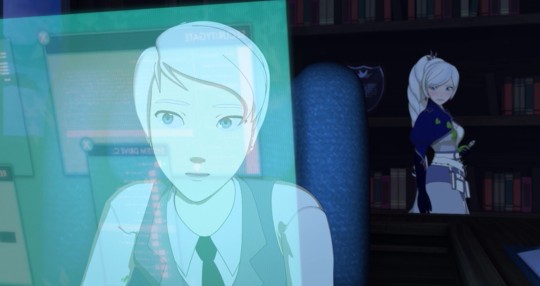
Blake manages to call Weiss about the Hound and she asks if Whitley can handle the airships without her. I mean, I assume so given that Weiss is looking at the bookshelves while Whitley does all the work lol. He makes a teasing comment about how he can if she can handle that grimm and she comments that they still need to work on his "attitude."
No they don't. Weiss stuck a weapon in her kid brother's face. Whitley made a joke. Even if Weiss' comment is likewise meant to be read as teasing, it's clear that we've bypassed any meaningful conversation between them. That hug was supposed to be a Fix Everything moment even though, as I've laid out elsewhere, it didn't even come close.
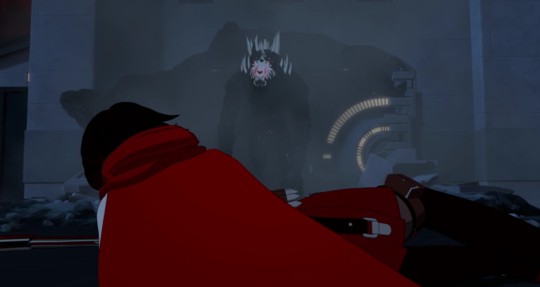
We cut back to Ruby getting thrown through a wall into the backyard and the Hound creepily coming after her. She's freaked out by this clearly abnormal grimm and Blake is weirdly... not? "It's just a grimm. Just focus!" Uh, it's obviously not. Have we reached the traumatized, sleep-deprived point where the group is sinking into full-blown denial? I wouldn't be surprised. They've been awake for like... 40+ hours.
Because the Hound knocks Ruby out with a single hit. Just, bam, she's down. "Focusing" is not the solution here.
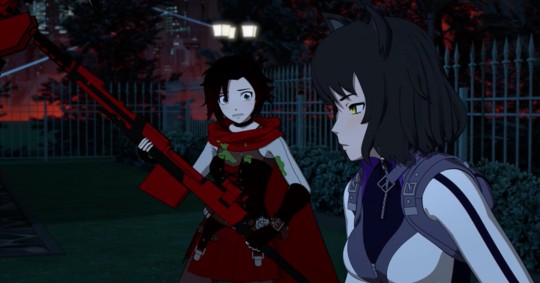
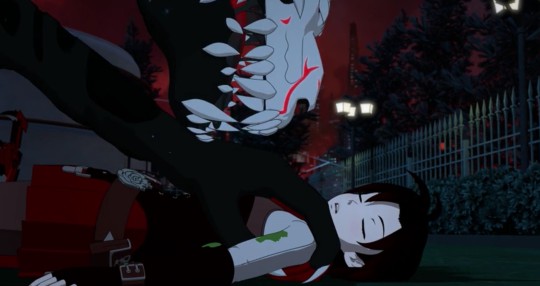
Weiss calls to warn the others about the grimm, telling them to stick together. Willow (understandably) starts freaking out and flees the room (classic horror trope!). Klein is left alone when Penny wakes up with red eyes. Oh no!
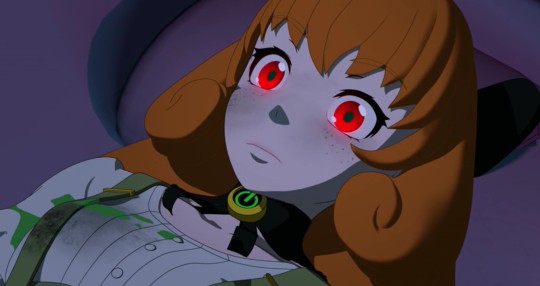
Don't worry. You know nothing meaningful happens.
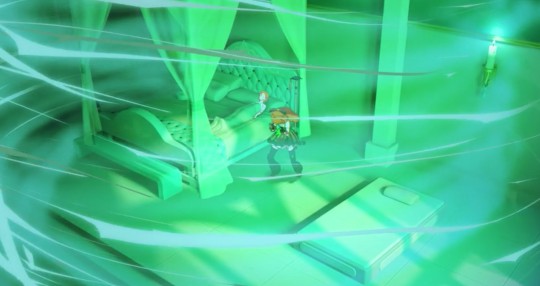
She shoves Klein before (somehow?) resisting the hack, her Maiden powers going wild in the process. Just when it looks as if Penny might cause some serious damage, Nora wakes up, takes her hand, and says, I kid you not:
"Hey... no one is going to make you do anything you don't want to do... It's just a part of you. Don't forget about the rest."
Okay. I want to re-emphasize that I love hopeful, uplifting, victory-won-through-the-power-of-love stories. Istg I'm not dead inside, it's just that RWBY does this so badly. I mean, what is this? It has similarities to the character shouting, 'No! Resist!' to their mind-controlled ally, but this is not presented as a desperate, last-ditch effort by Nora. She just speaks like this is the most obvious truth in the world. If you don't want to have your mind taken over... just don't! It's that simple. The problem definitely isn't that Watts has changed her coding and has implemented a command she can't override, it's that Penny has forgotten about the "rest" of her personhood.
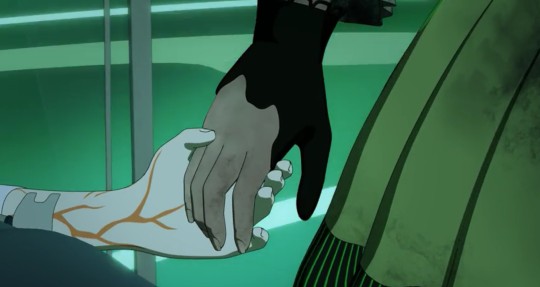
And this works. Granted, not for long, but we leave Nora having successfully calmed Penny down and until her eyes unexpectedly go red again scenes later, we're left assuming that this is a permanent solution. That, imo anyway, is taking the Power of Love too far, overriding the basic reality of Penny being hacked. It’s not a personal failing she must overcome, it’s an external attack. I would have rather had Nora react to the scars she saw on her arm, or have a moment with Klein, or get some love from the group. Not a wakes up, falls asleep, wakes up again to save Penny with a Ruby level 'Just ignore reality' pep-talk, then back to sleep again.
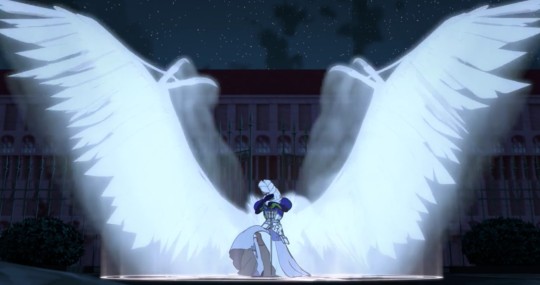
So Penny isn't attacking her allies, or mistakenly hurting her allies with wild Maiden powers. Not that the group doesn't have enough to deal with, but still. Weiss arrives to help with the Hound and attempts a new summon, only to fail when two minor grimm burrow up into her glyphs. I really enjoyed that moment, both for the wing visual and the knowledge that Weiss' glyphs can fail if you break them somehow (which makes sense). Also, I just like that she failed in general? Weiss is, as per usual now, about to demonstrate just how OP she is compared to the rest of the team, so it was nice to see her faltering here.
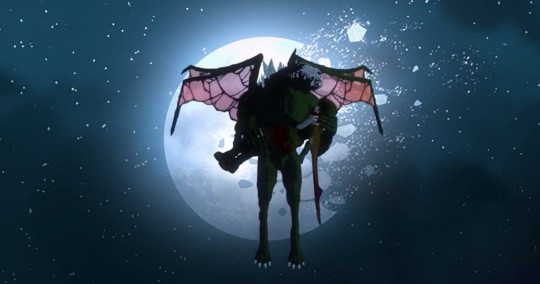
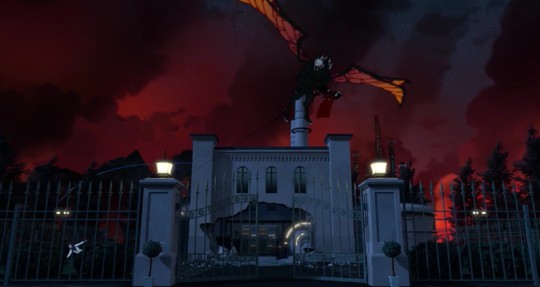
The Hound tries to make off with Ruby and Blake does an excellent job of keeping it tethered. Ruby finally wakes, only to realize that the grimm is actually after Penny since it's staring at her power up through the window, no longer trying to escape. Moments like this remind me that there's someone on RT's writing team that knows what they're doing, at least some of the time. The assumption that the Hound is after Ruby as a SEW, the surprise that it's actually Penny, realizing it holds up because Ruby is covered in Penny's blood and Blake is not... that's all nice, tight plotting. More of that please!
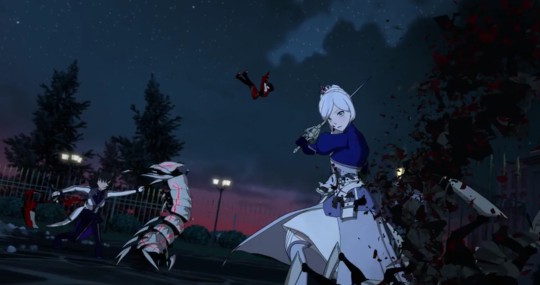
The Hound drops her and Ruby's aura shatters when she hits the ground. I want everyone to remember this moment as an example of how strong the Hound is. The group may be tired, but unlike YJR they've been sitting around in the Schnee manor for a number of hours, regaining strength. We saw the Hound hit Ruby twice — once through the wall and once to knock her out — and then she falls from a not very high distance for a huntress, yet her aura is toast. That's the level of power and skill the Hound possesses. Decimating YJR, knocking Oscar out, same for Ruby, avoiding Blake and Weiss' hits, soon to treat Penny like a ragdoll. Just remember all this for the episode's end.
Blake tells Weiss she'll take care of Ruby, you go help the others. Yay breaking up the duos more! Bad timing though as the new acid-spitting grimm pops out of the ground and Blake is now left alone to face it.
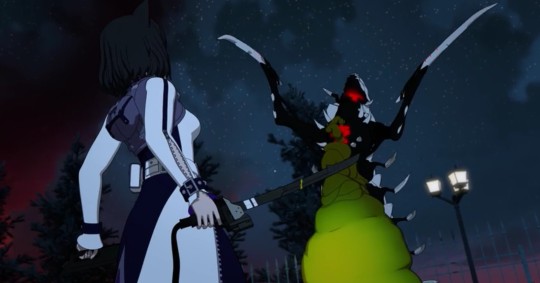
Weiss re-enters the mansion, knowing the Hound is somewhere nearby, but not where. Suddenly, Willow's voice sounds through her scroll with an, "Above you!" which... doesn't keep Weiss from getting hit lol. But it's the thought that counts! Willow has accessed the cameras she's set up throughout the manor, watching the Hound's movements, and I have to say, that is a WAY better use of her separation from Klein than I thought we were getting. I legit thought they'd have Willow run away in a panic, meet the Hound, die, and then Weiss could be sad about losing her mom.
It does say something about RWBY's writing that this was my knee-jerk theory, as well as my surprise when we got something way better.
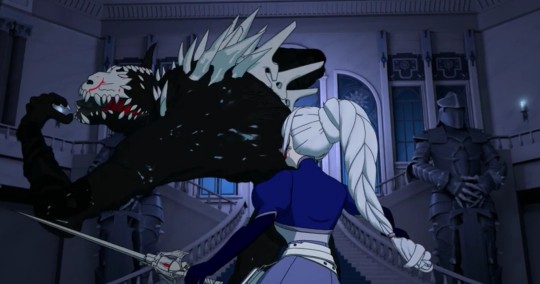
The Hound runs off, uninterested in Weiss, and she asks Willow to keep tabs on it. It heads for Whitley next (also covered in Penny's blood) and very creepily stalks him in the office with a, "I know you're here." Whitley is seconds away from being Hound chow before one of Weiss' boars pin it against the wall. He runs, then runs BACK to finish deploying the airships, before finally escaping assumed death. Goddamn this boy is pulling his weight.
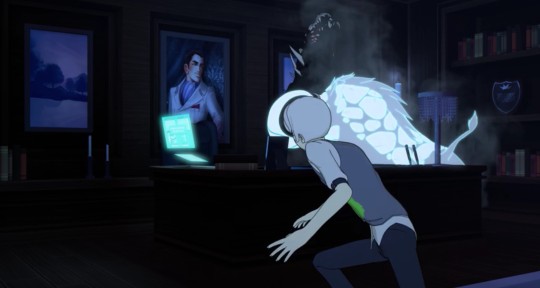
I assume all these ships are automated then? I hope someone takes a moment to call May. Otherwise it's going to be super weird for the Mantle citizens if a fleet of SDC ships just show up and hover there...
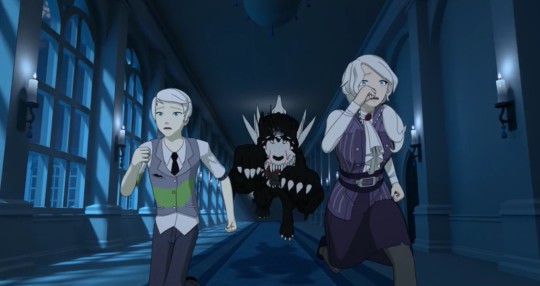
I don't entirely understand how Weiss saved him though. She's nowhere to be seen when Whitley leaves and he runs a fair distance before he and Willow encounter Weiss again. We know her summons don't have to keep right next to her, but are they capable of rudimentary thought, attacking an enemy — and an enemy only — despite Weiss being a couple corridors down and unable to see the current battlefield? I don't know. In another series I'd theorize that this was a deliberate hint, a way to clue us into the fact that Willow, someone who we currently know almost nothing about, had training in the past and summoned the boar herself. Weiss and Winter certainly didn't get that hereditary skill from Jacques. Hell, we might still get that, Weiss reacting with confusion next episode when Whitley thanks her for the boar, but I doubt it. That scene with Ruby and the Hound aside, the show isn't this good at laying groundwork and then following up on it.
Case in point: Weiss says, "I didn't forget you" to Whitley after he gets away from the Hound, the moment trying to harken back to her promise to Willow. Key word is "trying." Because she absolutely forgot him! Weiss threatened and ignored Whitley until he proved his usefulness. I also shouldn't need to point out that, "Don't forget your brother" does not mean, "Don't let your brother die a horrible death by abnormal grimm." Weiss acts like her saving him is a fulfillment of her promise, rather than just the most basic of human decency. And also, you know, her job.
So that part is frustrating. The entire Schnee dynamic is a mess, from Weiss making a joke of her father's arrest, to Willow (presumably) fixing their relationship by putting a hand on her daughter's shoulder. Okay.
Then Weiss cuts off the Hound by summoning a giant wall of ice. My brain, every time this happens:
YOU COULD HAVE FIXED THE HOLE IN MANTLE'S WALL.

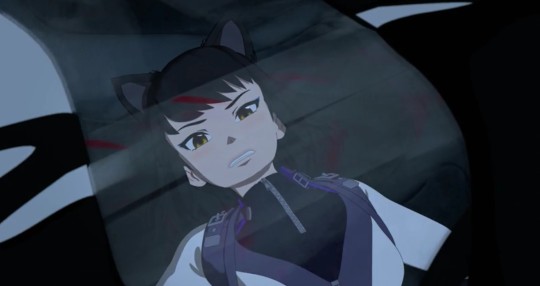
Moving on, Blake's fight against the acid... thing has some great choreography, including Blake using her semblance which we haven't seen in AGES.
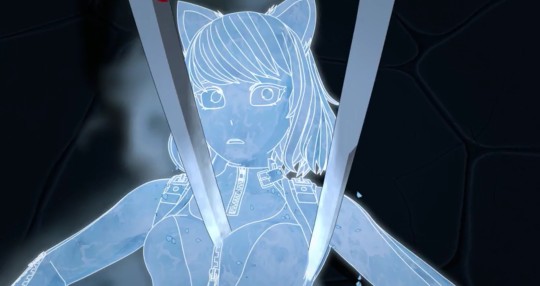
I really like the fight itself, just not what Blake is shouting the whole time. "I need you, Ruby! We all need you!" This has really gotten ridiculous. Ruby is presented as everyone's sole savior despite failing time and time again. It's not that I don't think Blake as a character should have faith in her leader, it's that I don't think the writers should be crafting a story where everyone puts their unshakable hopes in an untrained, disloyal, impulsive 17 year old. I mean, Ruby is currently unconscious, yet Blake is acting like if she doesn't wake up — she, as an individual, if Ruby Rose does not re-join this fight — then all is lost. If Ruby doesn't save them, no one can. Which is, of course, absurd on numerous levels. Blake doesn't need the passed out, aura-less Ruby right now, she needs the still very healthy Weiss pulling out multiple summons and an ice wall! Use your scroll and call for backup again.
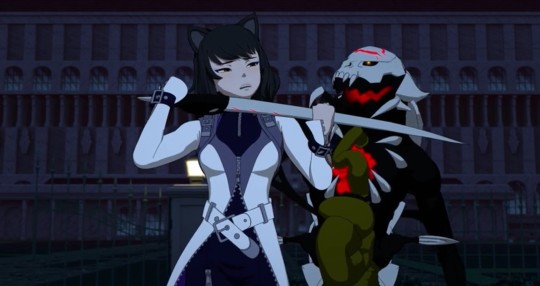
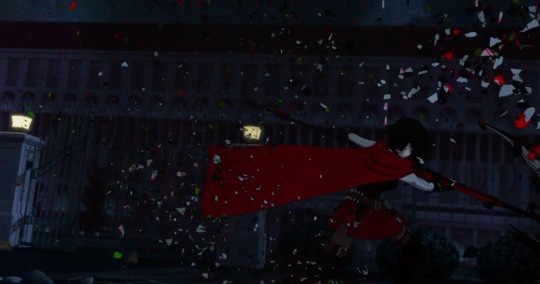
But of course, Ruby wakes up and kills the new, terrifying grimm with a single hit. It's a preview of what's to come with the Hound and it's just as ridiculous here as it will be there.
Speaking of the Hound, am I the only one who thought this was... cute?
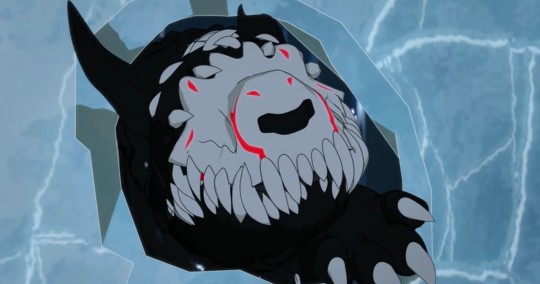
I can't possibly be the only one. That head-tilt is exactly what my dogs do and my brain instinctively went, "Aww, puppy!"
Murderous puppy.
The Hound realizes none of the Schnees are who it's looking for and runs off. Penny, meanwhile, has been fully taken over because, well, that's just what's convenient now. She resists long enough keep Amity up, then succumbs, then resists to apologize to Ruby, then succumbs, then resists because Nora asked her to, then succumbs once it's time to knock her out. If RWBY was willing to commit to consequences, Penny would have been taken over and that was that. The characters would need to deal with whatever outcome happens as a result. Instead, the show very carefully avoids any of those pesky consequences by having Penny successfully resisting at key moments, despite no explanation of how she's managing that.
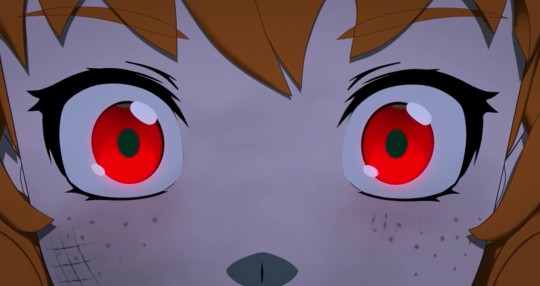
She shoves Klein again (Klein is having a Bad Time) and starts walking down the main steps. When Whitley wants to know where the hell she's going, Penny mechanically responds that she must "Open the vault, then self-destruct." I suppose the change Watts made was the self-destruct order? Ironwood obviously wants the vault open, though not necessarily Penny's death. Think what you will of his moral compass, she's a damn powerful ally — a research project, perhaps — and a Maiden to boot. At the very least, her death may give the powers to someone even worse.
God, please don't let them have brought Penny back and made her a Maiden just to kill her again.
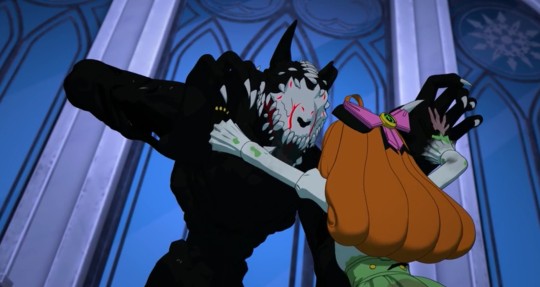
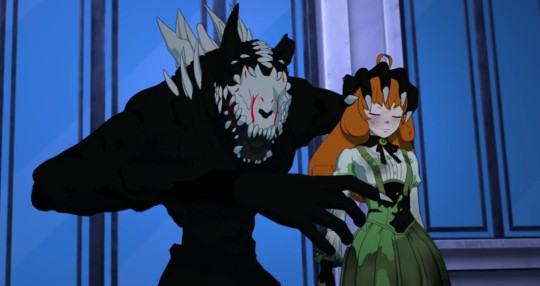
The Hound arrives though and, as said, knocks Penny out. We're back to square one with her, then. Note though that this attack is near instantaneous. She grabs its hands one second, is hanging limply the next. Wow, the Hound sure is a terrifying antagonist!
Not for long.
"That's enough," Ruby says and one-shots it with her eyes.
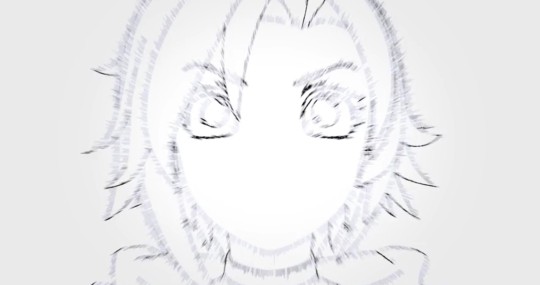
Now, I want to talk for a moment about the implications of that line. "That's enough." Obviously Ruby is #done with this situation and emotionally unwilling to let the Hound kidnap Penny (congratulations, Nuts and Dolts shippers), but there's a meta reading here as well. Not intentional, but glaring to me nonetheless. Basically, the idea that the Hound has, from a plot perspective, done enough. It has served its singular purpose. It kidnapped Oscar and now it dies. Never-mind how insanely powerful we've established the Hound to be, never-mind how Ruby's eyes also work or don't work according to whether anything of actual import is on the line. From a plot perspective "that's enough" and the Hound can be disposed of instantly. It got Oscar and gave us an episode of filler creepiness. Move along now.
The idea behind Ruby's eyes isn't bad, but the execution absolutely is. RT has undermined a huge portion of the stakes by giving their protagonist an instant kill-shot that always works precisely when she needs it to. Starting with the Apathy, we have yet to get a moment where Ruby's eyes fail to save the day when she really needs them to, no matter how incredible the challenge. The Hound was very intentionally written to be a grimm outside of the group's current power level. It thinks, it talks, they literally can't touch it. This creates the expectation that the group will need to grow stronger — or at least become smarter — in order to surmount this new obstacle, yet Ruby's eyes undermine all of that. The group hasn't grown in years, the show just makes enemies weaker as needed (Ace Ops), or has Ruby pull out her eyes as a trump card. It wouldn't be that bad if we'd at least gotten a good battle out of it, one where the group gets close to defeating the Hound on their own, but needs Ruby's eyes to finish it off. Instead, she literally walks up without any aura, announces to the audience that this antagonist's time is up, and blasts it out a window.
Granted, Ruby's eyes don't completely finish it. The Hound pulls itself to its feet and we see this.
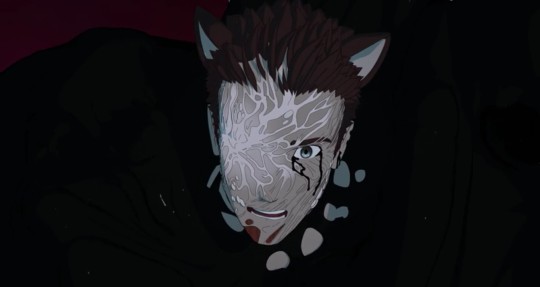
Yup, that's a guy and yup, those are silver eyes.
I would like to issue a formal apology to the "It's secretly Summer!" theorists in the fandom. I mean, I still think it would be ridiculous (and at this point highly improbable) that Ruby's dead mother has actually been a grimm mutant this whole time, just hanging out in Salem's realm while she waits for the plot to start before attacking the world, and then sends some no-name faunus dude after the group instead of their leader's mother for extra, emotional torture... but you all were definitely right about the “It's a person” part! I... don't know how I feel about this. Admittedly, it seems to be a logical continuation of the other grimm-human hybrids we've seen — namely Cinder and Salem herself — and it finally explains why Salem wants Ruby alive (even though it actually doesn't because WHY did she want more SEWs for Hound grimm when she wasn't even attacking back then? And already has all these other insanely powerful tools??), but at the same time, it feels like it's complicating a story that doesn't need further complications. The group fights monsters and has an immortal enemy. You don't need to add 'Some of those monsters are secretly human' to the mix.
It doesn't hurt that this twist is giving me Attack on Titan vibes, which, ew. A dark time in my fandom life, folks.
The Hound staggers a few steps before Whitley and Willow dump a suit of armor on it. That's all it takes to kill the most dangerous grimm we've ever seen: a single flash of silver eyes and some heavy metal. This also wreaks havoc with the implication that Salem wants SEWs alive because they create such powerful grimm. Obviously not. I mean yeah, normal huntsmen are going to have serious problems, we’ve seen that this volume, but any other SEWs nearby will take a Hound out instantaneously. For a villain with so many other powerful abilities — immortality, magic, endless normal grimm, her nifty soup — Salem would be much better served just killing SEWs straight out. Clearly, creating Hounds isn't worth the effort.
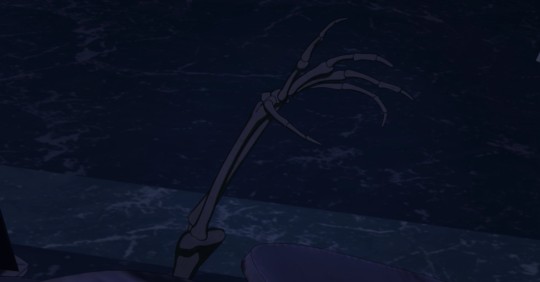
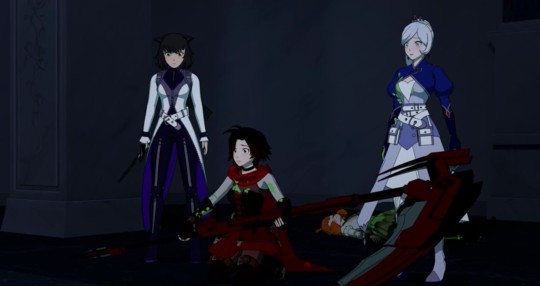
The Hound leaves some bones behind and Ruby collapses to her knees, overcome with the knowledge that this was once a person. Again, uncomfortable Attack on Titan parallels.
We finish our premiere with Cinder clearing away rubble to reveal Watts. Honestly, I like that we ended on this because her rescue is hilarious. She just slings him over her shoulders like a sack of potatoes and blasts off with her magic fire feet. Fantastic.
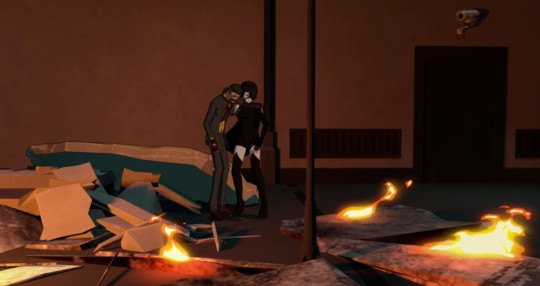
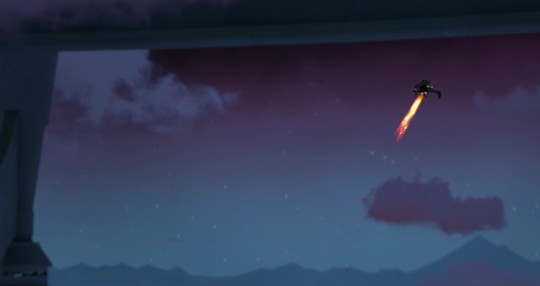
Note though that with this scene we've seen almost everything from the clip and the trailer. What's to come in the rest of Volume 8? No idea. Outside of Winter leading the charge with the bomb, we got it all here.
Time to update the bingo board!
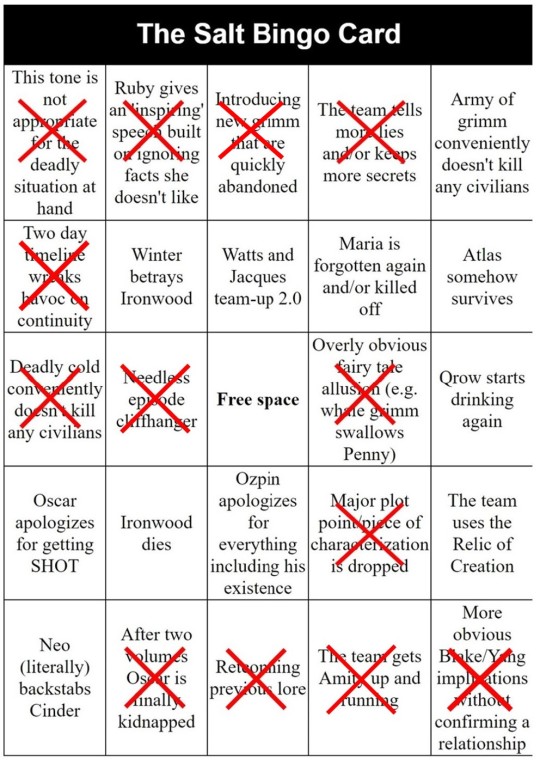
I'm crossing off "Introducing new grimm that are quickly abandoned." Between the Hound and acid-dude both falling to a single blast/cut from Ruby, we've more than earned this square.
It doesn't look as if we'll get another Watts-Jacques team-up now that he's left, but you never know.
Maria's got me worried. I feel like her Yoda fight against Neo is the one thing she'll be allowed to do this volume, but given that we didn't see anyone except Ruby's group this episode, we don't yet know whether the story is now ignoring her and Pietro, or if they'll re-appear in another episode like YJR.
Qrow is free. Will he get a drink before trying to murder Ironwood? Perhaps.
Still no bingo :(
All in all, the episode was by no means horrible. I think there were lots of horrible parts, but also some legitimately well executed moments, fun action, and scenes that I can easily imagine as squee worthy if you lean back and squint. Everything is comparative and in the growing collection of bad RWBY episodes, this one isn't securing a top slot. Which doesn't mean I think it's good, just... not as bad as it could have been and primarily only bad due to long-running problems, not things this specific episode has done. That's my bar then, so low it has officially entered the underworld.
Still, RWBY is back and a part of me is eager to see where this volume takes us, for better or for worse.
Until next week! 💜
[Ko-Fi]
74 notes
·
View notes
Note
Hello! Anti-Sessrin person here. You said if this couple becomes canon it will ruin Sesshomaru's character development. I would love it If you could elaborate on that because you're always so eloquent and smart. It's ok if you don't feel like it, though. Have a nice day!
I've actually been looking for an excuse to sit down and write out a cohesive post on my thoughts about this. Contrary to what the shippers want to believe, my interpretation of Sesshoumaru and Rin's relationship doesn't have anything to do with my moral objections to child grooming. I happen to think there's plenty of evidence for a filial interpretation in the text.
First, I'd like to preface my little essay here by saying I'm going off the manga alone. I haven't seen the anime in a long time, because I dropped it when I got a little tired of trying to reconcile the inconsistencies between the two mediums. So, if you read this and have an impulse to say, "hey, what about that thing in episode such-and-such...", keep in mind that I probably just don't remember what you're thinking of.
So, let's go back, alllll the way back, to Sesshoumaru's first appearance. Here's a guy who tears off a dude's head for no other reason than to get the attention of his subordinates to demand a boat. Here's a guy who's spent a long time looking just about EVERYWHERE for his father's remains, not to pay respects, but to plunder them. Here's a guy who feels ENTITLED to rob his dad's grave for treasure he deserves simply for being his father's son.
Sesshoumaru begins his journey as a selfish, spoiled, entitled brat. He doesn't fit the usual profile of a kid throwing a tantrum on the street because he wants the expensive toy sitting in the window; he's very posh and very reserved, but fundamentally, his motivation comes down to the simple fact that he wants Tessaiga. It doesn't even really have anything to do with respect and admiration of his father, otherwise he wouldn't have been so eager to rifle through dear old dad's bones to get at a sword when he had another heirloom right there at his hip. Only Tessaiga was representative of the sheer destructive force he wanted to wield, so he ignored the fact that his dad didn't seem to want him to have it.
This is important, because at first, Sesshoumaru doesn't seem to think of his father in terms of the guy's intentions or the steps he takes for the sake of his sons. Like most rich spoiled kids, Sesshoumaru views the Inu no Taishou in terms of his prestige and how that priviledge can be appropriated for selfish ends. Sesshoumaru wants Tessaiga not because he needs it, but because it's a birthright, and reinforces his legitimacy. When it's clear that Tessaiga seals Inuyasha's youkai blood, keeps him from going berserk, Sesshoumaru loses interest in Tessaiga - it's just a crutch for Inuyasha, and there's no prestige in taking it from him or using it for himself.
Sesshoumaru doesn't start to REALLY consider his father's intentions for the swords until later in the manga, when it comes out that Tenseiga was originally part of Tessaiga, and Inuyasha was meant to get the Meidou Zangetsuha attack eventually as well. It's at this point that Sesshoumaru starts to question if daddy actually HATED him, to give him a rather neat power disguised in a lame shell, but only to develop it so Inuyasha can have it instead, even after Inuyasha already got Tessaiga in the first place. It kind of looks to Sesshoumaru that Inuyasha gets all the powerful cool shit their father left behind, and that there might have been some favoritism coming down HARD on Inuyasha's side.
Above, you can see Sesshoumaru has two interlinked but distinct issues that are addressed throughout the story - his lack of compassion and empathy, and how tied his identity is to his father's favor and prestige. These two are somewhat separated in the narrative; there's a kind of pause in Sesshoumaru's development while a bulk of the middle of the story deals more with other characters and their development, but there is a little bit of a thematic connection between the two halves.
We'll start with the development of Sesshoumaru's compassion since, well, that's where the story begins working on his character. Right before Rin shows up, Toutousai let's Inuyasha's group in on the sword Sesshoumaru carries around and what it does, indicating that Tenseiga requires a compassionate heart to function. A bit ham-handed, but RT isn't very subtle most of the time, so we'll allow it. This sets up the next few scenes in which Sesshoumaru is unable to move and must play captive audience to a little girl doing the literal opposite of what he's used to. Sesshoumaru's habit is to show up and kill things, with no thought to the years of history, relationships, thoughts, emotions, etc that he's snuffing out. But while he's reclined injured in the woods, Rin demonstrates actual LIFE and the preservation of it, that part Sesshoumaru never gets to see. It's made all the starker by how BAD Rin is at caring for herself, let alone the strange monster she found in the woods. She does exactly nothing to help Sesshoumaru, despite how hard she tries, and is even injured by others in her attempts. She is the very picture of vulnerability, the opposite of the strong and capable Sesshoumaru.
This is a stark contrast, because anything less wouldn't be enough to create the necessary awareness of Rin's struggles that Sesshoumaru needs in order to use Tenseiga on here. And I know I've said this before, but I really cannot stress enough how obvious I think the symbolism is when Sesshoumaru uses Tenseiga for the first time; a phallic object gives life to a child, and the object's owner looks after that life throughout the rest of the story. He's not very good at looking after it, and it's clear that he's not sure about taking responsibility for Rin at first, because she pleaded for him to come back for her when he and Jaken left her behind to requisition a sword from Gaijinbou. To me, it's reminiscent of a teenager who knocked someone up, and ended up having to learn to give a crap about the result.
But, even if you don't accept that symbolism as particularly significant, Rin being a child, and human, and weak, unable to survive on her own, are important characteristics to how Sesshoumaru's compassion develops. Sesshoumaru is one of the strongest characters in the series, and he rarely has to worry about his own safety. And since he's in the habit of just murdering everyone he comes across if they're in his way, he's never had to worry about the safety of anyone else, either. When Rin comes into the picture, though, Sesshoumaru is faced with the uncomfortable reality of vulnerability in general. Through her earnest and incompetent attempts to foster survival in a world that can and does crush her, she's opened his eyes to how the disadvantaged, those without a powerful youkai lineage to rely on, have to struggle.
Rin herself has nothing to offer Sesshoumaru within this context of supreme vulnerability. She's not a friend, because she can't offer mutual support or use a skill to their benefit as a team. She's not a lover, because, well, she's a child and sexual/romantic attraction are conditions that wouldn't allow Sesshoumaru to extend his compassion beyond just her. As a mostly helpless kid, Rin has to rely upon Sesshoumaru and his power to survive, and Sesshoumaru employs his strength to keep her alive, getting nothing but a sweet smile out of it all. She gets all the benefits, he has all the obligations. This is PURE compassion - using one's advantages to another's benefit because you care about them, and not because you derive something from it as well.
This is why making Rin into Sesshoumaru's lover is a REALLY thoughtless take. It puts conditions on the compassion and muddies the message.
Moving onto Sesshoumaru's continued character development in the latter part of the story, the sword drama starts back up with slow, when Toutousai shows up and offers to reforge Tenseiga into a weapon. Sesshoumaru discovers that because he got angry enough to break his primary weapon in defense of Kagura's honor, he's triggered the next evolution of Tenseiga into something that can murder. Which is what he wanted at the beginning, yay! I want to point out here that Toutousai says Tenseiga noticed a change in Sesshoumaru's heart - anger for the first time for the sake of another. This implies that what Jaken said about Sesshoumaru getting tangled up in the fight against Naraku because Naraku kidnapping and using Rin to manipulate Sesshoumaru hurt Sesshoumaru's pride is actually accurate; he just really hated the thought of Naraku trying to use him, even if it was a failed attempt.
After going through HELL to develop the Meidou into a full circle (literally), Sesshoumaru then learns that the Meidou belongs to Tessaiga and Inuyasha, and that it's supposed to be handed over. Now, part of Sesshoumaru's angst over this idea, I think, is not just "did daddy love Inuyasha more?", but also the assumption that Inuyasha would have to KILL him in order to retake the Meidou Zangetsuha into Tessaiga. Thinking that your father meant for your little brother to kill you at some point to take your stuff is a pretty disturbing thought, to be entirely fair to him. This is why, when Sesshoumaru jumps into the meidou to take back control of the Naraku-possessed Tenseiga and breaks it deliberately, he spends the rest of the time in there moodily resigned to disappear. He genuinely believes that his father meant for him to die at this point, and even after they get out of there, he seems genuinely depressed.
This is Sesshoumaru's lowest point as a character. He's lost something he thought his father had meant for him, at his father's own wish, and he can't help but question why his dad would give him something just to take it away and give it to Inuyasha. It looks for all the world like favoritism, and since the Inu no Taishou is dead, there's no asking him what the hell the meaning of all this is.
This is all leading to one of the most infuriatingly ridiculous scenes I have ever seen in a manga - when Magatsuhi has crushed Sesshoumaru and everyone thinks he's been killed/absorbed, Magatsuhi is blown apart and rendered unable to reform by the shiny new sword clutched in Sesshoumaru's newly regrown arm. I could talk your ear off about how having Sesshoumaru stop being an amputee is erasure of consequences for his actions, or how being given back an arm is kind of a slap in the face for actual amputees, and where the mother f*ck did that sword come from anyway, but that's not what this essay is about, so I'll just keep all that to myself. The point of this is articulated by Toutousai when he says that Sesshoumaru had to let go of Tessaiga and his father's heirloom to stand on his own as a daiyoukai.
We've already gone over how Sesshoumaru is one of the most powerful characters in the series, who rarely has to worry about his well-being. He's just really strong without having to try. Sesshoumaru had already learned that he didn't need Tessaiga ages ago - he knew this when he learned that Inuyasha needed Tessaiga to keep from tearing himself apart eventually. But when he thought he had been passed down something from his father that was truly meant to be his, only to put all this work into it so that Inuyasha could have it, that embittered him again. It's not that he wanted the sword necessarily, but the thoughts and consideration of his father, who seemed to be putting everything he had into Inuyasha.
But his previous experiences protecting and considering someone (in some cases, multiple someones) weaker than him should have tipped him off. During the very battle in which he got his new arm and sword, he was actively helping those around him avoid Magatsuhi and keeping them close because he had a plan and the strength to carry it out. He was willing to take the extra step to protect Inuyasha and friends before trying to take care of Magatsuhi though, and that was the point. He put everyone else's needs ahead of his own, even Inuyasha's, and he did it without even thinking.
Toutousai just articulated what Sesshoumaru should have already intuitively known by that point. He never needed his father's heirlooms, the swords, his dad's power. They were unnecessary for him from the start. Inuyasha needed a leg up, because his own BODY could kill him after a while. But Sesshoumaru always had the capability of being great on his own. He just needed to finally separate his ego from who his father was and become his own person; stand on his own as a great youkai. While I don't agree with the execution, I can get behind the big lesson - don't rely on your daddy's wealth and influence to prop you up, and do the work to build a personality and identity of your own.
Which is ANOTHER reason why making Rin into a lover would be a thoughtless take. It would walk back Sesshoumaru's final lesson about being his own person apart from his father.
So, there you go. A comprehensive post regarding my take on Sesshoumaru's character development. I could add in a bit about Sesshoumaru coming to understand his father's consideration and the lengths he went to for the sake of protecting Inuyasha by having to give similar consideration to Rin, but I think this post is long enough, and that one statement on that aspect pretty much sums it up. Let me know if you would like me to elaborate on any of this, or if you would like to argue any of the points, I'm up for it. Might take me a minute to respond, mind you, but hopefully it won't take as long as it did to draft this behemoth.
Take care.
#inuyasha#rin (inuyasha)#sesshomaru#sesshoumaru#character analysis#character development analysis#i pulled out all the stops for this one#anti sessrin#i know this doesn't match the perfect prince characterization Sesshoumaru usually gets#but i just calls it as i sees it
124 notes
·
View notes
Text
Devotional Hours Within the Bible

by J.R. Miller
Jesus on the Way to Jerusalem
(Matthew 19:1-2 and Matthew 19:13-26)
The words, "He departed from Galilee," have significance, when we consider the circumstances, which give them a peculiar sadness. This was our Lords' final departure from Galilee. He had been brought up there. Much of His public ministry had been wrought there. In that part of the country, He had met with the kindliest reception. He had multitudes of friends in Galilee. He had performed countless miracles there, and had been a comforter of numberless sorrowing and suffering ones. Now He was leaving the dear familiar scenes - and the people He loved so well. No wonder the throngs followed Him. The farewell must have been tender.
Some incidents of the journey are given. One was a discussion with the Pharisees concerning divorce. Jesus in His words gave most important teaching on the sacredness of marriage. "So they are no longer two, but one. Therefore what God has joined together, let man not separate."
Another incident was the bringing of little children to Him that He might bless them. It is not said that the mothers brought them - but this is probable. The language in Luke strengthens this inference. "Then little children were brought to Jesus for him to place his hands on them and pray for them." The disciples probably thought their Master ought not to be troubled with babies and little children, and so they rebuked those who were bringing them. But Jesus was moved with indignation when He saw what His disciples were doing, and said, "Let the little children come to me, and do not hinder them, for the kingdom of heaven belongs to such as these." This was one of the few times when it is said Jesus was angry. It grieved Him to have his disciples try to keep the children away from Him. He would not have anyone kept from coming to Him - but if any are more welcome than others, they are children. Very beautiful is the picture we see. He welcomed the children to Him, took them in His arms, laid His hands on them and blessed them.
Another incident in this journey to Jerusalem is that of the rich young ruler who came to Jesus with such earnestness, and then went away from Him so sadly. All that is told to us about this young man's coming to Jesus, shows us his sincerity and earnestness. "A man ran up to Him - and fell on his knees before Him" (Mark 10:17). The running shows how eager he was, and his eagerness tell of an unsatisfied heart. He seems to have attained the best that a young man could reach, without taking Christ into his life. He was young, with powers fresh and full. He was rich, with the honor, ease, distinction and influence that riches give. The fact that he was a ruler shows the confidence his fellow men put in him. Is moral character was above reproach, for he said, without boasting, that he had scrupulously kept the commandments. He was a man of winning disposition, for Jesus loved him and was drawn to him in a peculiar manner. It would be hard to conceive of a man - with more to satisfy him.
Yet with all his good qualities, his worldly advantages, his good name and his conscience void of offense - he was not satisfied! He needed something more to make his life complete.
The question which this young man asked of Jesus is the most important question ever asked in this world. "What shall I do that I may have eternal life?" We do not know how much he understood about the eternal life concerning which he inquired. The fact, however, that he asked the question, shows that he had at least some glimmering of the better life for which he hungered. No matter how much pleasure, or how great success, or how high honor one may gain in the world, if at the end of three score and ten years - he passes into eternity unsaved - what comfort will it give him to remember his fine success on the earth?
A rich man failed in business. He gathered up the fragments of his wrecked fortune - a few thousand dollars. He determined to go to the West and start anew. He took his money and built a splendid car, furnishing it in the most luxurious style, and stocking it with provisions for his journey. In this sumptuous car he traveled to his destination. At length he stepped from the door of his car - and only then thought for the first time of his great folly. He had used all his money in getting to his new home, and now had nothing with which to use there. This incident illustrates the foolishness of those who think only of this life - and make no provision for eternity .
Answering the young mans question, Jesus turned his thoughts to the commandments. "If you would enter into life, keep the commandments." He referred him to the law, which he might show him how he had missed the mark, how far short he had come of gaining life by his own obedience. "You know the commandments." It is easy enough to imagine one's self quite obedient, while one puts easy interpretation upon the Divine law. But when one has seen the law in all its lofty purity, in its wide spiritual application, in its absolute perfection, and then has compared his own life with it - he soon learns that he needs a Savior!
A pupil may think his writing is good - until he compares it with the copy at the top of the page, and then all its faults appear. The young artist may think his pictures are fine - until he looks upon the works of some great master, and then he never wants to see his own poor painting again. So long as on has no true conception of the meaning of the commandments, he may think himself fairly good; but when he undertakes what the commandments really require, he is at once convicted of sin.
There must have been pity in the heart of Jesus, as He looked upon the young man and heard him say glibly, "All these things have I observed from my youth." He did not know what he was saying, when he spoke thus of his own obedience. But Jesus very frankly answers his question, "One thing you lack!" (Mark 10:21). He was not far from the kingdom of God, and yet he was not in it. Many men are good, almost Christians, and yet not Christians. It may be only one thing that is lacking - but that one thing is the most important of all, the last link in the chain that would unite the soul to the Savior. It is the final step that takes one over the line - from death into life, out of condemnation into glorious blessedness. One may go to the very edge - and not step over; he may reach the door - and not enter. Almost a Christian - is not a Christian. Almost saved - is still lost.
Jesus made a very large demand upon this young man. He said to him, "Sell everything you have, and give to the poor… and come and follow Me." This is not a prescription for being saved by good works - that is not the way Christ saves men. He saw this young man's weakness, that with all his excellent qualities - his heart was still wedded to the world, and the test which He gave, required him to give up that which stood between him and eternal life. He would not be saved by giving his riches to the poor. Charity is not a way of salvation. But the young man could not be saved until his idol was broken! So the demand was to get him to give up his money - and take Christ into his heart.
It was a hard battle that was fought those moments, in this young man's heart. It grieved him not to be able to enter the circle of Christ's followers - but he could not pay the price. "At this the man's face fell. He went away sad, because he had great wealth." He wanted to go with Jesus - but he could not accept the conditions. Let us think of him after this day. He kept his money - but every time he looked at it - he would be forced to remember that he had give up Christ and eternal life for the sake of it. He would see written over his piles of gold and his deeds and bonds, "These things cost me eternal life!" His experience was just the reverse of the man who found the pearl of great price (Matthew 13:46) and then sold all he had - and bought it. The young ruler found the pearl, asked the price, and considered the purchase - but did not buy it, because he was not willing to pay so much.
As the young man turned away Jesus was grieved, and said to the disciples, "How hard it is for the rich to enter the kingdom of God!" Just so, it is not easy to be rich - and to be a Christian. Christ spoke many earnest words concerning money and the danger of loving money. Yet not many people seem to be afraid of getting rich .
One morning a pastor found on his pulpit desk a bit of paper with these words on it: "The prayers of this congregation are requested for a man who is growing rich." It seemed a strange request - but no doubt it was a wise one. No men more need to be prayed for - than those who are becoming prosperous, becoming rich.
A priest said that among all the thousands who had come to him with confession of sin - not one had ever confessed the sin of covetousness. Men are not conscious of their danger - when they are growing rich.
Jesus did not say that a rich man cannot be saved. He said, "With men this is impossible; but with God all things are possible." This means that every man growing rich, needs God in order to be saved. If riches master him, he is lost. Unless God is his Lord - he cannot enter the heavenly kingdom.
There is a story of a rich man, one of whose ships was delayed at sea. When one day had passed with no tidings, the man was anxious, and with each added day his anxiety increased. At length, however, he awoke to the fact that his money was having a tremendous hold upon him. He then ceased to worry about the ship and became anxious for his own soul. He was determined to break the perilous mastery, and taking the value of his ship, he gave it at once to a charitable object. We all need to deal thus rigorously with ourselves, whether we have only a little money or much - that money may never be our master - but that Christ may be Master always; and money our servant, to do our bidding and Christ's.
#Devotional Hours Within the Bible#Jesus on the Way to Jerusalem#Matthew 19:1-2#J.R. Miller#Matthew 19:13-26#July 30#2021
6 notes
·
View notes
Text
The Dread Wolf

Some speculation on Solas’ dread wolf form (Tevinter Nights spoilers below)
All around us was light and color, a dizzying array of the magic that makes up the world of spirits, and it swirled around the Tevinter mage and his ritual knife as though he were the eye of a hurricane. Something huge trembled around us—a spirit so great that it shook parts of the Fade I had always considered to be neutral, devoid of life—and high overhead, where the Black City shadowed the sky, I heard a great booming roar.
But before the Tevinter mage could complete his ritual, the Dread Wolf arrived.
It was no elf, no mortal mage. It was a beast unlike any I had ever seen. Lupine in appearance, but the size of a high dragon, with shaggy spiked hide and six burning eyes like a pride demon, and it came to us on wings of fire that resolved themselves into a horde of lesser demons as the Dread Wolf landed before us.
-Dragon Age Tevinter Nights
So, I’ve been thinking about Solas’ dread wolf form, and what it it means /entails.
In Tevinter Nights, the Dread Wolf appears from the fade to stop the Mortalitasi’s blood magic ritual.
Based on the Mortalitasi’s story, I theorise the terrifying Dread Wolf form is Solas himself and not a separate entity like Nightmare serving Corypheus.
===
First, the backstory
Personally, I think there is a lot of strong evidence Solas was originally some kind of spirit before manifesting as a physical, mortal elf. He doesn’t identify strongly with people and elves, saying to the Inquisitor he only thinks of himself as “me”. His only friends are spirits, and he has spent a lot of time justifying to himself why spirits should be considered people. He gets very passionate about this topic if you walk into his rhetoric on the matter.
Solas understands spirits because I think he was one to begin with. There have been hints that the ancient elves used spirits and bound them to their will. It would explain why Solas is so against using spirits and twisting them against their nature.
While we might visit the Fade, it is his natural home, and the spirits there serve him gladly.
After the events of Trespasser, and the events in Tevinter Nights, I think Solas has taken the form of the six-eyed wolf to reside in the fade physically. I presume this is advantageous for him so he can ensure his ritual to tear down the veil completes successfully. Using the dread wolf form allows him to build up his terrifying image while also scaring away mages and spirits from disrupting his plans.
We already know with the anchor he would have been able to walk the fade physically. With Mythal’s power now within him, there is nothing stopping him from living there permanently. Instead of shape shifting into a dragon like the evanuris however, Solas shapeshifts into a massive reptilian wolf.
I don’t think the wolf form is a separate entity, nor do I think this wolf form is a spirit serving him like Nightmare was serving Corypheus.
Solas may have many parallels to Corypheus but using a spirit or even a person as one half of his persona is not his MO. Solas only relies on himself- he wants to be the one in control at all times. He may rely on spirits to help with whatever tasks he needs to carry out, but I don’t think he would ever rely on a spirit so much so it formed one half of his dread wolf image.
===
The Dread Wolf of the Fade
Now I think Solas’ origin/spirit self is important, because it will play a part in how we truly see him, and thus, form how we redeem or stop (”kill”) him.
Around the start of DA:I, he says:
The fade reflects the mind of the living. If you expect a spirit of wisdom to be a pride demon, it will adapt. And if your mind is free of corrupting influences? If you understand the nature of the spirit? They can be fast friends.
I don’t think his physical/fade form is like anything we have seen in any previous games or lore before. He says himself, the ancient elven gods weren’t truly gods but “mages”, or "something this age has not yet seen”. I don’t think he’s an abomination like Anders, but closer to a spirit that has manifested and evolved like Cole, over millenia. If so maybe the term demon is more appropriate to describe his form (and to be clear, I think Solas is definitely not a simple spirit but something much more - he says himself in dialogue with Cole “I am not a spirit, and sometimes it is hard to remember such simple truths).
What Solas has is the understanding and kinship of spirits coupled with the physicality of a mortal body. He can walk the fade and affect the minds of others through dreams. If you remember Feynriel in DA2, it was said a dreamer abomination would be extraordinarily powerful and they would be able to affect the dreams of others. Perhaps Solas is a bit like Feynriel except he *is* the only entity- rather than possessing someone, he is the sole physical manifestation of his demon self. When he is in the fade, he can shapeshift into his wolf form by using the fear inspired by his Dread Wolf persona, much like Nightmare can.
Whatever you know of this mage, put it aside. Whether he is truly the Dread Wolf of elven myth, I cannot say—it is not uncommon for powerful spirits to be worshipped as gods, as the Avvar do. But whatever fear the name of the Dread Wolf carries, he has earned. While we might visit the Fade, it is his natural home, and the spirits there serve him gladly. They whisper in my dreams now, accusing me of crimes I never committed and promising vengeance if my wards fail. A weaker mage would be dead already, or mad.
And as clear as the Dread Wolf’s anger at what we had done—the Mortalitasi binding spirits he considered his own, the Tevinter mage using forbidden blood magic—was the feeling that we had disrupted his own work.
He intends something for the Fade, and if he wants the idol, then whatever he intends will be terrible.
This is why Solas positions himself as this big scary wolf demon to begin with. He wants people to be afraid of him because he can use their fear against them.
If our protagonist gets the chance to see him as a person or even a friend, they will see him in the fade for who he truly is- someone who at the end of the day, is a morally grey person with "good” intentions. And if they see him as a big bad wolf who wants worldwide destruction, he can use that fear to feed his wolf form as well.
This is where it’s important to note the distinction between humans and spirits. In Cole’s personal quest, spirits forgive by simply “forgetting”. Contrast this to physical beings, who forgive by working through pain and accepting it. I think DA4 will feature a pretty big existential crisis for Solas - where (hopefully) we can steer him towards the path of being a morally grey physical being, or the one track minded spirit intent on fulfilling his personal destiny at all costs.


Solas vs. himself
If you look at the murals and tarot cards in DA:I, he and the wolf are in sync with each other. Benevelont, looming, scary, confident, prideful, terrifying. In all the Inquisition artworks, he is in a position of control, actively using the Dread Wolf persona to carry out his actions.
Contrast this to the teaser mural, where the wolf has literally turned it’s back on Solas. Meanwhile, Solas stands his ground with his hand outstretched against the evanuris (the semicircles), the idol, and the wolf all at once.

In Trespasser, if Cole is made more a spirit he says this:

“When this is done, I will slip back safely, a spirit. Someone is hurting. He needs me to remember who he is.”
I think he is most definitely referring to Solas in this case.
Cole knows way more about Solas than he lets on throughout the game, and in a way, he has access to the bigger picture which we can only speculate on. This is why, when you say you want to kill Solas at the end of Trespasser, Cole greatly disapproves. It’s also why so many spirits willingly serve the dread wolf in the fade. Solas’ actions are clearly beneficial for the spirits of the fade, but whether or not he accounts for people in reality will be up to our own personal choices in game.
The more Solas takes on the form of the Dread Wolf and the more he resides in the fade physically, the more of his mortal self he will forget. It’s just the nature of being “part spirit”. If spirits encounter information they don’t want to process or understand, they simply forget. His inner struggle is the part that wants to be a spirit vs. the part that has mortal ties and emotions based in reality. This is why when he says “I will never forget you” to a romanced Lavellan, it is so significant, and so tragic.
"Wisdom knows enduring is pain. He hurts for her, another of many he couldn't save. He carries necessary deaths." (this quote refers to his spirit of wisdom friend in his personal quest)
If Solas wanted to, he probably could simply forget. He did after all, make Cole forget “They sleep, masked in a mirror, hiding, hurting, and to wake them... (Gasps.) Where did it go?”
Him choosing to remember the pain is what differentiates him from any conventional spirit.
This is ultimately how I think Solas’ arc will culminate in DA4.
Will Solas inevitably lose control of his Dread Wolf persona and take up the mantle of the uncontrollable, power mad villain he swore he never was?
Or can we get him to realise the more human side to him, the side that accepts and deals with pain and mistakes and regret- the side that believes in the right of “all free willed beings to exist”?
89 notes
·
View notes
Text
15.09 vs. 11.10: Chuck, Lucifer, and the Art of Persuading Sam Winchester
15.09 gave me strong 11.10 vibes, for obvious reasons. And so, because I had 11.10 in my mind while watching 15.09, I immediately started thinking about why Sam capitulated relatively easily in 15.09, while in 11.10, facing worse circumstances and a more convincing argument, Sam did not.
Here are my lengthy thoughts about that comparison . This is also a thinly veiled excuse for me to compare and contrast Lucifer and Chuck. (What a great family.)
Let’s start out with the observation that Chuck and Lucifer both care a lot about their respective images.
Lucifer’s wanted to be regarded as plenty of different things—a wronged son, a martyr, a terrifying power, a teller of harsh truths, king of all evil, a good father. He plays an active role in his own mythos; he wants to be the center of attention. He’s the hero of his own story, and no one else gets a say.
Chuck, instead, takes a behind-the-scenes role. While he cares just as much as or more about PR than his son does, he wants to be viewed as both lofty and benevolent. He wants to be so removed from mortal affairs that moral codes don’t apply to him, and yet also, paradoxically, be seen as magnanimous and kind. He’s not the hero; he’s the Wizard of Oz offering gracious intervention, and he’s the bard recording tales with a spin of poetic untruthfulness.
Chuck is less personally cruel—he doesn’t do his own dirty work, he hangs his righteousness on small rescues and insignificant kindnesses; he shrugs and points out his creations are free to make their own choices in the death mazes he designs. He pretends to think he can take honest feedback. He’s even squeamish about hurting Sam.
Chuck, like his son, likes to think he’s not the bad guy. Lucifer will try to persuade people to do what he wants, but failing that, he won’t hesitate to coerce them. Chuck usually likes to think he doesn’t do the same thing, but his snapping point is just as perilously close to the surface. In 15.09, Chuck tries force before he tries psychology, the opposite of Lucifer in 11.10. And this isn’t so surprising. Chuck is unaccustomed to being defied—every significant time it’s happened historically, it ends with the offending party stewing in cosmic lockup rather than seeing the error of their ways—whereas Lucifer, who whipped up a full-on rebellion back in the day, is extremely accustomed to using persuasion.
Unlike Chuck, Lucifer doesn’t care about whether people think he’s nice, or generous. He commits all sorts of cruelties that he views as either deserved, minor, or morally irrelevant, because he thinks his higher objectives are justification for pretty much anything. He hurts people who’ve hurt him before, or he hurts people whose lives he considers insignificant, or he hurts people in service to a ~philosophical point~ that he thinks is important.
So, when it comes time to persuade Sam, Lucifer is focused on himself. He makes explicit the case that what he can bring to the table is the most important part of the deal: he can beat Amara. He’s selling himself as the hero, as a power that Sam cannot deny.
Chuck isn’t selling himself. Nor is he offering a wizard’s solution, some kind of deus ex machina that’s surely within his power. Instead, he’s just trying to demoralize Sam, and frankly he’s kinda bad at it. His torture is subpar and he knows it. His threats are all ones Sam’s heard or even lived before. But it’s still important to him that he be perceived as not just a storyteller, but the storyteller. His sale, like Lucifer’s, is still predicated on power—an ill-defined power over the narrative that Sam doesn’t understand.
Chuck doesn’t understand Sam half so well as Lucifer does. Chuck’s pitch is a threat against Sam’s future, and it’s one that might have been a lot more devastating ten years ago for Sam—the “your family will die hunting” and even the “you’ll become a MONSTER, Sam” ultimatums are much better tailored for early seasons Sam than late. It smacks of the same slavishness to traditional Winchester Tropes (tm) that had Chuck trying unsuccessfully to get Lilith in a 20-something vessel to seduce Dean: he doesn’t really get that his characters have changed and aged.
In fairness, Sam doesn’t understand Chuck terribly well either. The one bit of insight Sam manages is realizing that Chuck doesn’t like getting his own hands bloody, but he’s wrong-footed by Chuck’s insistence that, actually, the vamp!chesters ending isn’t one of his favorites. Sam’s obviously uncomfortable with being unable to assess the scope of Chuck’s knowledge and plans. He can’t tell what’s a story draft and what isn’t, or which kinds of suffering Chuck wants for him and which he doesn’t. Neither does Sam have the same personal spite for Chuck that he has for Lucifer—and this more than anything else is the reason he allows himself to capitulate to Chuck’s threat.
Lucifer’s pitch in 11.10 was based on the past. He uses a litany of Sam’s accomplishments and weaknesses to lean heavily on Sam’s guilt complex. His arguments boil down to this: You can’t trust yourself to make decisions. Your only real reason to say no is your selfish fear of me. You’d doom the planet just to spite me, you’d make a choice thinking only of your own discomfort and everyone in the world will suffer for it.
And because he knows Sam so well, these hits land immediately. It’s a good pitch, well-calculated—Sam doesn’t trust himself, Sam is afraid, and Sam knows he’s not capable of a rational decision under these extreme circumstances.
But it doesn’t work. Because frankly, it all lands a little TOO well, well enough that Sam’s able to throw out the whole thing out of, basically, sheer spite. Instead of being swayed by these arguments that he can’t refute, Sam finds himself willing to admit that, yeah, Lucifer’s right, Sam IS willing to risk the Darkness to spite him; he hates and fears him enough that he’s willing to rely on faith in some other option, ANY other option, as long as Lucifer doesn’t get another shot at the world. Sam says, more or less, “okay, fine, you’re right, but have you considered FUCK YOU.”
No matter the logic, no matter the emotions, no matter the carrots or sticks, Sam can always rely on the core principle that “Lucifer should not be allowed to get what he wants, because screw that guy.”
But Chuck’s not Lucifer. Sam doesn’t have the same bone-deep conviction that whatever Chuck wants will inevitably make everything worse. And that’s why Chuck’s pitch, though it gets a C+ from me compared to Lucifer’s solid A, works.
It’s not even clear whether Chuck’s forecast is a threat or a prediction—is he saying without narrative interference, chaos will inevitably win out? Or is he claiming that he will cause this monster outbreak intentionally? Either way, Sam supposes, it doesn’t really matter. He believes the threat, as much as he ever believed the doom of the Darkness. And while he knows he might be able to survive it or find a way around it, he really, really doesn’t want to be forced to, not if he can avoid it. Defying Chuck is neither as necessary nor as clear-cut as defying Lucifer.
#i speaks#15.09#11.10#chuck and lucifer#sam and chuck#sam and lucifer#sam and torture#look#i am having wayyyy too much fun#with the cosmic family that Hates Sam Winchester#family bonding goals: Make Sam Sad#an objective i can really get behind
62 notes
·
View notes
Photo

New Orleans (1947)
The city of New Orleans is synonymous with a rich cultural tapestry shaped over centuries. Located on the banks of the Mississippi River, its economic and political influence waned with the spread of railroads and highways. Today, its influences are indigenous American, African, French, Spanish, Creole, Honduran, Vietnamese, and much more. But the city remains an inimitable cultural force. One of the city’s most significant contributions to the world is jazz – a musical genre that, even in the mid-twentieth century, attracted racially-coded disdain.
I must admit that I am instantly suspicious of any film that takes a city’s name as its title. Being not in a sniping mood as I write this sentence, I will not single any certain film out – for now. But to reduce a film title to a city’s name is to heighten expectations that the filmmaker will capture the so-called “soul” of a city (a nearly impossible task). Or perhaps they shall depict a man-made or natural disaster that takes place in that city (how often does a city’s name become shorthand for a mass shooting?). Enter Arthur Lubin’s New Orleans: a quasi-musical that does not have the courage to let the musical numbers guide it. The film stars Louis Armstrong (essentially playing himself) and Billie Holiday (not playing herself in her only credited role in a feature film), in addition to other jazz stalwarts at the time: Woody Herman, drummer Zutty Singleton, clarinetist Barney Bigard, trombonist Kid Ory, guitarist Bud Scott. New Orleans makes the mistake of not having Armstrong and Holiday be the main stars. Instead, the film has a half-baked, predictable romance. For a film title with such enormous implications, New Orleans’ concentration makes no sweeping statements about the eponymous city. Instead, it turns its gaze to jazz’s reputation among high-society white Americans.
It is 1917. The Storyville district of New Orleans is a den of prostitution, drinking, gambling, and – worst of all – jazz. Storyville’s residents are mostly black, but some of its welcome patrons are white. Nick Duquesne (Mexican actor Arturo de Córdova) runs a gambling joint frequented by Mrs. Rutledge Smith (Irene Rich) and classical music conductor/pianist Henry Ferber (Richard Hagerman). Irene avoids the jazz there (one of the regulars is Louis Armstrong and the aforementioned players), but her daughter, Miralee (Dorothy Patrick) – an operatic soprano who has arrived in New Orleans to make her professional classical music debut – is entranced by this radical music. Miralee is also entranced with Nick, against her mother’s wishes. Miralee is staying with her relative when she meets their maid, Endie (Billie Holiday), who surreptitiously plays the piano and sings jazz music when she gets the chance. As you might imagine, Endie’s employers disapprove. The film comes to a head as the U.S. military forcibly shuts down Storyville (evicting hundreds of black residents overnight), Nick leaves New Orleans, and Miralee must contend with her emotions just before she makes her classical music professional debut.
Billie Holiday’s fans might be troubled by the fact she is a maid here, given that she intentionally avoided physically demanding occupations in real life. Her reaction to this casting is unclear, as different reputable sources offer contradictory claims: that she abhorred being cast as a maid (Meg Greene’s Billie Holiday: A Biography), or that she relished the opportunity to be in a motion picture regardless of the role (an interview with music journalist Leonard Feather). So as tough as it may be to see her in a subservient role, Holiday appears to be enjoying herself – especially during the musical numbers she is a part of. She is clearly, other than Louis Armstrong, the most musically accomplished member of the cast. But when her character disappears from the film in the final third, New Orleans heaves due to the hackneyed romance between Nick and Miralee. To toss the one actor making this film worth watching for no sensible reason is a disastrous choice by screenwriters Elliot Paul (1941’s A Woman’s Face, 1945’s Rhapsody in Blue) and Dick Irving Hyland (1947’s Kilroy Was Here).
Even in a film independently released through United Artists (the one major Hollywood studio of Old Hollywood with the least executive interference), she and Armstrong cannot be the central stars. Considering Holiday’s musical talents, one wonders why she never starred in another film. Despite some digging, I could not find the answer. But if any black woman musician could have films centered around her, it would be Holiday. Her contemporaries, Lena Horne and Ethel Waters, could never overcome the terrible beliefs that audiences would not pay to see a film with a black actress in the lead role. But did Holiday – noting how Louis Armstrong also appeared in films – want to make more films? That may be an answer for someone else to uncover.
More than any film of its time that I can recall, New Orleans is overflowing with a disobedient musical energy. When considering musical genres innovated by African-Americans, there is an underground aspect to their initial spread that, at first, appears exclusive. Jazz, R&B, and hip hop have all gone through these motions: a tumultuous, secretive birth; a rebellious adolescence where critics decry the moral fabric of such music; and finally mainstreaming. Jazz in New Orleans lies somewhere within that adolescence. Its troubled reputation is the result of a mixture of musical and racial tensions. New Orleans’ affluent white community, on its surface, disdains jazz and prefers the import that is Western classical music – opinions they express vocally (as an amateur classically-trained musician who learned more about jazz later in life, I can’t stand the gatekeeping behavior exemplified in this film). So any time that jazz music is played in an unorthodox setting – the parlor of the Smith household, an orchestra hall – it feels defiant, dangerous.* These musical-racial dynamics persist in America to this day. To even see a film acknowledge that conflict, however ineloquently, is credit to the screenwriters and director Arthur Lubin understanding aspects about musical popular culture of this time.
But what is New Orleans and New Orleans without music? First sung by Holliday and reprised (one might even say appropriated in the negative sense) multiple times is, “(Do You Know What It Means to Miss) New Orleans”, with music by Louis Alter and lyrics by Edgar De Lange. Louis Armstrong is on his signature trumpet, a phalanx of great jazz instrumentalists play on the flanks, and Billie Holiday’s voice captures the timbre necessary in any song about longing.
Do you know what it means to miss New Orleans
And miss it each night and day?
I know I’m not wrong, the feeling’s getting stronger
The longer I stay away.
youtube
It is a song representative of this film’s failed ambitions as an embodiment of New Orleans’ spirit. But it is also a brilliant showcase for some of the great jazz figures working at this time – including instrumental performances by Woody Herman and his orchestra and a virtuosic performance of “Honky Tonk Train Blues” by pianist Meade “Lux” Lewis. Nevertheless, New Orleans’ most soulful performances always revolve around Armstrong and Holiday singing Alter and De Lange’s original compositions. Other soundtrack highlights include “The Blues are Brewin’” and “Farewell to Storyville”. The former exemplifies Holiday’s timeless appeal, her singing voice’s unornamented pathos that elevates the simplest of lyrics. The latter is the most context-dependent song in the soundtrack and occurs as the U.S. military orders the closure of the speakeasies and gambling joints of Storyville – a swinging elegy without defeatism. New Orleans is at its most enjoyable during these musical numbers, and the film just feels lost whenever Armstrong and Holiday are not present or when any of the supposed leads open their mouths to speak.
That Lubin and the film’s producers do not trust the soundtrack to carry New Orleans indicates an ironic misgiving towards jazz music itself. United Artists’ refusal to reward Armstrong and Holiday star billing over de Córdova and Patrick is probably rooted to then-contemporary reality that movie theaters in the American South refused to show films with black leads. In addition, jazz music – like in this film – was not yet completely in the mainstream. If it appeared in a Hollywood film (and elements of jazz often appeared in mid-century American musicals), it almost always would be presented and popularized by a white performer. This development is not exclusive to jazz, let alone artistic medium. The filmmakers, in New Orleans’ final third, muddle their message through such appropriation. “Cultural appropriation” at its most basic definition is a neutral concept, but the developments in the film’s closing scenes – intentional or otherwise – extend this appropriation by presenting a white person’s presentation of jazz as more acceptable to a general audience than a black person’s.
For New Orleans, it remains obscure in terms of Hollywood musicals, African-American cinema, and within the esteemed United Artists filmography. In the present day, it serves best as an exhibition for some of the most acclaimed jazz musicians and performers working in the 1940s. To those fans of the numerous black jazz performers appearing in the film, New Orleans is a bittersweet reminder of what may have been.
My rating: 6.5/10
^ Based on my personal imdb rating. Half-points are always rounded down. My interpretation of that ratings system can be found in the “Ratings system” page on my blog (as of July 1, 2020, tumblr is not permitting certain posts with links to appear on tag pages, so I cannot provide the URL).
For more of my reviews tagged “My Movie Odyssey”, check out the tag of the same name on my blog.
* In one scene in an orchestral concert hall, jazz is played as an encore to a classical music concert. It says volumes that the audience is beside themselves and that all of the members of the orchestra (and Richard Hagerman, playing their conductor) are transfixed.
#New Orleans#Arthur Lubin#Arturo de Córdova#Dorothy Patrick#Louis Armstrong#Billie Holiday#Marjorie Lord#Irene Rich#John Alexander#Richard Hageman#Elliot Paul#Dick Irving Hyland#Herbert J. Biberman#Nat W. Finston#Woody Herman#Eddie DeLange#Louis Alter#TCM#My Movie Odyssey
4 notes
·
View notes
Text
A riot is the language of the unheard
“But it is not enough for me to stand before you tonight and condemn riots. It would be morally irresponsible for me to do that without, at the same time, condemning the contingent, intolerable conditions that exist in our society. These conditions are the things that cause individuals to feel that they have no other alternative than to engage in violent rebellions to get attention. And I must say tonight that a riot is the language of the unheard. And what is it America has failed to hear? It has failed to hear that the plight of the negro poor has worsened over the last twelve or fifteen years. It has failed to hear that the promises of freedom and justice have not been met. And it has failed to hear that large segments of white society are more concerned about tranquility and the status quo than about justice and humanity.“
"The Other America"
Speech by
Rev. Martin Luther King, Jr.
Grosse Pointe High School - March 14, 1968
Rev. Dr. Harry Meserve, Bishop Emrich, my dear friend Congressman Conyers, ladies and gentlemen.
I need not pause to say how very delighted I am to be here tonight and to have the great privilege of discussing with you some of the vital issues confronting our nation and confronting the world. It is always a very rich and rewarding experience when I can take a brief break from the day-to-day demands of our struggle for freedom and human dignity and discuss the issues involved in that struggle with concerned people of good will all over our nation and all over the world, and I certainly want to express my deep personal appreciation to you for inviting me to occupy this significant platform.
I want to discuss the race problem tonight and I want to discuss it very honestly. I still believe that freedom is the bonus you receive for telling the truth. Ye shall know the truth and the truth shall set you free. And I do not see how we will ever solve the turbulent problem of race confronting our nation until there is an honest confrontation with it and a willing search for the truth and a willingness to admit the truth when we discover it. And so I want to use as a title for my lecture tonight, "The Other America." And I use this title because there are literally two Americas. Every city in our country has this kind of dualism, this schizophrenia, split at so many parts, and so every city ends up being two cities rather than one. There are two Americas. One America is beautiful for situation. In this America, millions of people have the milk of prosperity and the honey of equality flowing before them. This America is the habitat of millions of people who have food and material necessities for their bodies, culture and education for their minds, freedom and human dignity for their spirits. In this America children grow up in the sunlight of opportunity. But there is another America. This other America has a daily ugliness about it that transforms the buoyancy of hope into the fatigue of despair. In this other America, thousands and thousands of people, men in particular walk the streets in search for jobs that do not exist. In this other America, millions of people are forced to live in vermin-filled, distressing housing conditions where they do not have the privilege of having wall-to-wall carpeting, but all too often, they end up with wall-to-wall rats and roaches. Almost forty percent of the Negro families of America live in sub-standard housing conditions. In this other America, thousands of young people are deprived of an opportunity to get an adequate education. Every year thousands finish high school reading at a seventh, eighth and sometimes ninth grade level. Not because they're dumb, not because they don't have the native intelligence, but because the schools are so inadequate, so over-crowded, so devoid of quality, so segregated if you will, that the best in these minds can never come out. Probably the most critical problem in the other America is the economic problem. There are so many other people in the other America who can never make ends meet because their incomes are far too low if they have incomes, and their jobs are so devoid of quality. And so in this other America, unemployment is a reality and under-employment is a reality. (I'll just wait until our friend can have her say) (applause). I'll just wait until things are restored and. . .everybody talks about law and order. (applause)
Now before I was so rudely interrupted… (applause), and I might say that it was my understanding that we're going to have a question and answer period, and if anybody disagrees with me, you will have the privilege, the opportunity to raise a question if you think I'm a traitor, then you'll have an opportunity to ask me about my traitorness and we will give you that opportunity.
Now let me get back to the point that I was trying to bring out about the economic problem. And that is one of the most critical problems that we face in America today. We find in the other America unemployment constantly rising to astronomical proportions and black people generally find themselves living in a literal depression. All too often when there is mass unemployment in the black community, it's referred to as a social problem and when there is mass unemployment in the white community, it's referred to as a depression. But there is no basic difference. The fact is, that the negro faces a literal depression all over the U.S. The unemployment rate on the basis of statistics from the labor department is about 8.8 per cent in the black community. But these statistics only take under consideration individuals who were once in the labor market, or individuals who go to employment offices to seek employment. But they do not take under consideration the thousands of people who have given up, who have lost motivation, the thousands of people who have had so many doors closed in their faces that they feel defeated and they no longer go out and look for jobs, the thousands who've come to feel that life is a long and desolate corridor with no exit signs. These people are considered the discouraged and when you add the discouraged to the individuals who can't be calculated through statistics in the unemployment category, the unemployment rate in the negro community probably goes to 16 or 17 percent. And among black youth, it is in some communities as high as 40 and 45 percent. But the problem of unemployment is not the only problem. There is the problem of under-employment, and there are thousands and thousand, I would say millions of people in the negro community who are poverty stricken - not because they are not working but because they receive wages so low that they cannot begin to function in the main stream of the economic life of our nation. Most of the poverty stricken people of America are persons who are working every day and they end up getting part-time wages for full-time work. So the vast majority of negroes in America find themselves perishing on a lonely island of poverty in the midst of a vast ocean of material prosperity. This has caused a great deal of bitterness. It has caused a great deal of agony. It has caused ache and anguish. It has caused great despair, and we have seen the angered expressions of this despair and this bitterness in the violent rebellions that have taken place in cities all over our country. Now I think my views on non-violence are pretty generally known. I still believe that non-violence is the most potent weapon available to the negro in his struggle for justice and freedom in the U.S.
Now let me relieve you a bit. I've been in the struggle a long time now, (applause) and I've conditioned myself to some things that are much more painful than discourteous people not allowing you to speak, so if they feel that they can discourage me, they'll be up here all night.
Now I wanted to say something about the fact that we have lived over these last two or three summers with agony and we have seen our cities going up in flames. And I would be the first to say that I am still committed to militant, powerful, massive, non-violence as the most potent weapon in grappling with the problem from a direct action point of view. I'm absolutely convinced that a riot merely intensifies the fears of the white community while relieving the guilt. And I feel that we must always work with an effective, powerful weapon and method that brings about tangible results. But it is not enough for me to stand before you tonight and condemn riots. It would be morally irresponsible for me to do that without, at the same time, condemning the contingent, intolerable conditions that exist in our society. These conditions are the things that cause individuals to feel that they have no other alternative than to engage in violent rebellions to get attention. And I must say tonight that a riot is the language of the unheard. And what is it America has failed to hear? It has failed to hear that the plight of the negro poor has worsened over the last twelve or fifteen years. It has failed to hear that the promises of freedom and justice have not been met. And it has failed to hear that large segments of white society are more concerned about tranquility and the status quo than about justice and humanity.
Now every year about this time, our newspapers and our televisions and people generally start talking about the long hot summer ahead. What always bothers me is that the long hot summer has always been preceded by a long cold winter. And the great problem is that the nation has not used its winters creatively enough to develop the program, to develop the kind of massive acts of concern that will bring about a solution to the problem. And so we must still face the fact that our nation's summers of riots are caused by our nations winters of delay. As long as justice is postponed we always stand on the verge of these darker nights of social disruption. The question now, is whether America is prepared to do something massively, affirmatively and forthrightly about the great problem we face in the area of race and the problem which can bring the curtain of doom down on American civilization if it is not solved. And I would like to talk for the next few minutes about some of the things that must be done if we are to solve this problem.
The first thing I would like to mention is that there must be a recognition on the part of everybody in this nation that America is still a racist country. Now however unpleasant that sounds, it is the truth. And we will never solve the problem of racism until there is a recognition of the fact that racism still stands at the center of so much of our nation and we must see racism for what it is. It is the nymph of an inferior people. It is the notion that one group has all of the knowledge, all of the insights, all of the purity, all of the work, all of the dignity. And another group is worthless, on a lower level of humanity, inferior. To put it in philosophical language, racism is not based on some empirical generalization which, after some studies, would come to conclusion that these people are behind because of environmental conditions. Racism is based on an ontological affirmation. It is the notion that the very being of a people is inferior. And their ultimate logic of racism is genocide. Hitler was a very sick man. He was one of the great tragedies of history. But he was very honest. He took his racism to its logical conclusion. The minute his racism caused him to sickly feel and go about saying that there was something innately inferior about the Jew he ended up killing six million Jews. The ultimate logic of racism is genocide, and if one says that one is not good enough to have a job that is a solid quality job, if one is not good enough to have access to public accommodations, if one is not good enough to have the right to vote, if one is not good enough to live next door to him, if one is not good enough to marry his daughter because of his race. Then at that moment that person is saying that that person who is not good to do all of this is not fit to exist or to live. And that is the ultimate logic of racism. And we've got to see that this still exists in American society. And until it is removed, there will be people walking the streets of live and living in their humble dwellings feeling that they are nobody, feeling that they have no dignity and feeling that they are not respected. The first thing that must be on the agenda of our nation is to get rid of racism.
Secondly, we've got to get rid of two or three myths that still pervade our nation. One is the myth of time. I'm sure you've heard this notion. It is the notion that only time can solve the problem of racial injustice. And I've heard it from many sincere people. They've said to the negro and/to his allies in the white community you should slow up, you're pushing things too fast, only time can solve the problem. And if you'll just be nice and patient and continue to pray, in a hundred or two hundred years the problem will work itself out. There is an answer to that myth. It is the time is neutral. It can be used either constructively or destructively. And I'm sad to say to you tonight I'm absolutely convinced that the forces of ill will in our nation, the forces on the wrong side in our nation, the extreme righteous of our nation have often used time much more effectively than the forces of good will and it may well be that we may have to repent in this generation not merely for the vitriolic words of the bad people who will say bad things in a meeting like this or who will bomb a church in Birmingham, Alabama, but for the appalling silence and indifference of the good people who sit around and say wait on time. Somewhere we must come to see that human progress never rolls in on the wheels of inevitability, it comes through the tireless efforts and the persistent work of dedicated individuals who are willing to be co-workers with God and without this hard work time itself becomes an ally of the primitive forces of social stagnation. And so we must always help time and realize that the time is always right to do right.
Now there is another myth and that is the notion that legislation can't solve the problem that you've got to change the heart and naturally I believe in changing the heart. I happen to be a Baptist preacher and that puts me in the heart changing business and Sunday after Sunday I'm preaching about conversion and the need for the new birth and re-generation. I believe that there's something wrong with human nature. I believe in original sin not in terms of the historical event but as the mythological category to explain the universality of evil, so I'm honest enough to see the gone-wrongness of human nature so naturally I'm not against changing the heart and I do feel that that is the half truth involved here, that there is some truth in the whole question of changing the heart. We are not going to have the kind of society that we should have until the white person treats the negro right - not because the law says it but because it's natural because it's right and because the black man is the white man's brother. I'll be the first to say that we will never have a truly integrated society, a truly colorless society until men and women are obedient to the unenforceable. But after saying that, let me point out the other side. It may be true that morality cannot be legislated, but behavior can be regulated. It may be true that the law cannot change the heart but it can restrain the heartless. It may be true that the law can't make a man love me, but it can restrain him from lynching me, and I think that's pretty important also.
And so while legislation may not change the hearts of men, it does change the habits of men when it's vigorously enforced and when you change the habits of people pretty soon attitudes begin to be changed and people begin to see that they can do things that fears caused them to feel that they could never do. And I say that there's a need still for strong civil rights legislation in various areas. There's legislation in Congress right now dealing with the whole question of housing and equal administration of justice and these things are very important for I submit to you tonight that there is no more dangerous development in our nation than the constant building up of predominantly negro central cities ringed by white suburbs. This will do nothing but invite social disaster. And this problem has to be dealt with - some through legislation, some through education, but it has to be dealt with in a very concrete and meaningful manner.
Now let me get back to my point. I'm going to finish my speech. I've been trying to think about what I'm going to preach about tomorrow down to Central Methodist Church in the Lenten series and I think 1'11 use as the text, "Father forgive them for they know not what they do."
I want to deal with another myth briefly which concerns me and I want to talk about it very honestly and that is over-reliance on the bootstrap philosophy. Now certainly it's very important for people to engage in self-help programs and do all they can to lift themselves by their own bootstraps. Now I'm not talking against that at all. I think there is a great deal that the black people of this country must do for themselves and that nobody else can do for them. And we must see the other side of this question. I remember the other day I was on a plane and a man starting talking with me and he said I'm sympathetic toward what you're trying to do, but I just feel that you people don't do enough for yourself and then he went on to say that my problem is, my concern is that I know of other ethnic groups, many of the ethnic groups that came to this country and they had problems just as negroes and yet they did the job for themselves, they lifted themselves by their own bootstraps. Why is it that negroes can't do that? And I looked at him and I tried to talk as understanding as possible but I said to him, it does not help the negro for unfeeling, sensitive white people to say that other ethnic groups that came to the country maybe a hundred or a hundred and fifty years voluntarily have gotten ahead of them and he was brought here in chains involuntarily almost three hundred and fifty years ago. I said it doesn't help him to be told that and then I went on to say to this gentlemen that he failed to recognize that no other ethnic group has been enslaved on American soil. Then I had to go on to say to him that you failed to realize that America made the black man's color a stigma. Something that he couldn't change. Not only was the color a stigma, but even linguistic then stigmatic conspired against the black man so that his color was thought of as something very evil. If you open Roget's Thesaurus and notice the synonym for black you'll find about a hundred and twenty and most of them represent something dirty, smut, degrading, low, and when you turn to the synonym for white, about one hundred and thirty, all of them represent something high, pure, chaste. You go right down that list. And so in the language a white life is a little better than a black life. Just follow. If somebody goes wrong in the family, we don't call him a white sheep we call him a black sheep. And then if you block somebody from getting somewhere you don't say they've been whiteballed, you say they've been blackballed. And just go down the line. It's not whitemail it's blackmail. I tell you this to seriously say that the nation made the black man's color a stigma and then I had to say to my friend on the plane another thing that is often forgotten in this country. That nobody, no ethnic group has completely lifted itself by it own bootstraps. I can never forget that the black man was free from the bondage of physical slavery in 1863. He wasn't given any land to make that freedom meaningful after being held in slavery 244 years. And it was like keeping a man in prison for many many years and then coming to see that he is not guilty of the crime for which he was convicted. Alright good night and God bless you.
And I was about to say that to free, to have freed the negro from slavery without doing anything to get him started in life on a sound economic footing, it was almost like freeing a man who had been in prison many years and you had discovered that he was unjustly convicted of, that he was innocent of the crime for which he was convicted and you go up to him and say now you're free, but you don't give him any bus fare to get to town or you don't give him any money to buy some clothes to put on his back or to get started in life again. Every code of jurisprudence would rise up against it. This is the very thing that happened to the black man in America. And then when we look at it even deeper than this, it becomes more ironic. We're reaping the harvest of this failure today. While America refused to do anything for the black man at that point, during that very period, the nation, through an act of Congress, was giving away millions of acres of land in the west and the mid-west, which meant that it was willing to under gird its white peasants from Europe with an economic floor. Not only did they give the land, they built land grant colleges for them to learn how to farm. Not only that it provided county agents to further their expertise in farming and went beyond this and came to the point of providing low interest rates for these persons so that they could mechanize their farms, and today many of these persons are being paid millions of dollars a year in federal subsidies not to farm and these are so often the very people saying to the black man that he must lift himself by his own bootstraps. I can never think ... Senator Eastland, incidentally, who says this all the time gets a hundred and twenty-five thousand dollars a year, not to farm on various areas of his plantation down in Mississippi. And yet he feels that we must do everything for ourselves. Well that appears to me to be a kind of socialism for the rich and rugged hard individualistic capitalism for the poor.
Now let me say two other things and I'm going to rush on. One, I want to say that if we're to move ahead and solve this problem we must re-order our national priorities. Today we're spending almost thirty-five billion dollars a year to fight what I consider an unjust, ill-considered, evil, costly, unwinable war at Viet Nam. I wish I had time to go into the dimensions of this. But I must say that the war in Viet Nam is playing havoc with our Domestic destinies. That war has torn up the Geneva accord, it has strengthened, it has substituted. . .(interruption). . .alright if you want to speak I'll let you come down and speak and I'll wait. You can give your Viet Nam speech now listen to mine. Come right on.
Speaker: Ladies and gentlemen, my name is Joseph McLawtern, communications technician, U.S. Navy, United States of America and I fought for freedom I didn't fight for communism, traitors and I didn't fight to be sold down the drain. Not by Romney, Cavanagh, Johnson--nobody, nobody's going to sell me down the drain.
Alright, thank you very much. I just want to say in response to that, that there are those of us who oppose the war in Viet Nam. I feel like opposing it for many reasons. Many of them are moral reasons but one basic reason is that we love our boys who are fighting there and we just want them to come back home. But I don't have time to go into the history and the development of the war in Viet Nam. I happen to be a pacifist but if I had had to make a decision about fighting a war against Hitler, I may have temporarily given up my pacifism and taken up arms. But nobody is to compare what is happening in Viet Nam today with that. I'm convinced that it is clearly an unjust war and it's doing so many things--not only on the domestic scene, it is carrying the whole world closer to nuclear annihilation. And so I've found it necessary to take a stand against the war in Viet Nam and I appreciate Bishop Emrich's question and I must answer it by saying that for me the tuitus? cannot be divided. It's nice for me to talk about ... it's alright to talk about integrated schools and in integrated lunch counters which I will continue to work for, but I think it would be rather absurd for me to work for integrated schools and not be concerned about the survival of the world in which to integrate.
The other thing is, that I have been working too long and too hard now against segregated public accommodations to end up at this stage of my life segregating my moral concern. I must make it clear. For me justice is indivisible. Injustice anywhere is a threat to justice everywhere.
Now for the question of hurting civil rights. I think the war in Viet Nam hurt civil rights much more than my taking a stand against the war. And I could point out so many things to say that. . . a reporter asked me sometime ago when I first took a strong stand against the war didn't I feel that I would have to reverse my position because so many people disagreed, and people who once had respect for me wouldn't have respect, and he went on to say that I hear that it's hurt the budget of your organization and don't you think that you have to get in line more with the administration's policy ... and of course those were very lonely days when I first started speaking out and not many people were speaking out but now I have a lot of company and it's not as lonesome now. But anyway, I had to say to the reporter, I'm sorry sir but you don't know me. I'm not a consensus leader and I do not determine what is right and wrong by looking at the budget of the Southern Christian Leadership Conference or by kind of taking a look at a gallop poll and getting the expression of the majority opinion. Ultimately, a genuine leader is not a succor for consensus but a mold of consensus. And on some positions cowardice ask the question is it safe? Expediency asks the question is it politics? Vanity asks the question is it popular? The conscience asks the question is it right? And there comes a time when one must take a position that is neither safe nor politics nor popular but he must do it because conscience tells him it is right.
Now the time is passing and I'm not going to… I was going into the need for direct action to dramatize and call attention to the gulf between promise and fulfillment. I've been searching for a long time for an alternative to riots on the one hand and timid supplication for justice on the other and I think that alternative is found in militant massive non-violence. I'll wait until the question period before going into the Washington campaign. But let me say that it has been my experience in these years that I've been in the struggle for justice, that things just don't happen until the issue is dramatized in a massive direct-action way. I never will forget when we came through Washington in 1964, in December coming from Oslo. I stopped by to see President Johnson. We talked about a lot of things and we finally got to the point of talking about voting rights. The President was concerned about voting, but he said Martin, I can't get this through in this session of Congress. We can't get a voting rights bill, he said because there are two or three other things that I feel that we've got to get through and they're going to benefit negroes as much as anything. One was the education bill and something else. And then he went on to say that if I push a voting rights bill now, I'll lose the support of seven congressmen that I sorely need for the particular things that I had and we just can't get it. Well, I went on to say to the President that I felt that we had to do something about it and two weeks later we started a movement in Selma, Alabama. We started dramatizing the issue of the denial of the right to vote and I submit to you that three months later as a result of that Selma movement, the same President who said to me that we could not get a voting rights bill in that session of Congress was on the television singing through a speaking voice "we shall overcome" and calling for the passage of a voting rights bill and I could go on and on to show. . .and we did get a voting rights bill in that session of Congress. Now, I could go on to give many other examples to show that it just doesn't come about without pressure and this is what we plan to do in Washington. We aren't planning to close down Washington, we aren't planning to close down Congress. This isn't anywhere in our plans. We are planning to dramatize the issue to the point that poor people in this nation will have to be seen and will not be invisible.
Now let me finally say something in the realm of the spirit and then I'm going to take my seat. Let me say finally, that in the midst of the hollering and in the midst of the discourtesy tonight, we got to come to see that however much we dislike it, the destinies of white and black America are tied together. Now the races don't understand this apparently. But our destinies are tied together. And somehow, we must all learn to live together as brothers in this country or we're all going to perish together as fools. Our destinies are tied together. Whether we like it or not culturally and otherwise, every white person is a little bit negro and every negro is a little bit white. Our language, our music, our material prosperity and even our food are an amalgam of black and white, so there can be no separate black path to power and fulfillment that does not intersect white routes and there can ultimately be no separate white path to power and fulfillment short of social disaster without recognizing the necessity of sharing that power with black aspirations for freedom and human dignity. We must come to see. . .yes we do need each other, the black man needs the white man to save him from his fear and the white man needs the black man to free him from his guilt.
John Donne was right. No man is an island and the tide that fills every man is a piece of the continent, a part of the main. And he goes on toward the end to say, "any man's death diminishes me because I'm involved in mankind. Therefore, it's not to know for whom the bell tolls, it tolls for thee." Somehow we must come to see that in this pluralistic, interrelated society we are all tied together in a single garment of destiny, caught in an inescapable network of mutuality. And by working with determination and realizing that power must be shared, I think we can solve this problem, and may I say in conclusion that our goal is freedom and I believe that we're going to get there. It's going to be more difficult from here on in but I believe we're going to get there because however much she strays away from it, the goal of America is freedom and our destiny is tied up with the destiny of America. Before the Pilgrim fathers landed at Plymouth we were here. Before Jefferson etched across the pages of history the majestic words of the Declaration of Independence we were here. Before the beautiful words of the Star Spangled Banner were written we were here. And for more than two centuries our forbearers labored here without wages. They made cotton King, they built the homes of their masters in the midst of the most humiliating and oppressive conditions and yet out of a bottomless vitality they continued to grow and develop and if the inexpressible cruelties of slavery couldn't stop us, the opposition that we now face including the white backlash will surely fail.
We are going to win our freedom because both the sacred heritage of our nation and the eternal will of the Almighty God are embodied in our echoing demands. So however difficult it is during this period, however difficult it is to continue to live with the agony and the continued existence of racism, however difficult it is to live amidst the constant hurt, the constant insult and the constant disrespect, I can still sing we shall overcome. We shall overcome because the arc of the moral universe is long but it bends towards justice.
We shall overcome because Carlisle is right. "No lie can live forever." We shall overcome because William Cullen Bryant is right. "Truth crushed to earth will rise again." We shall overcome because James Russell Lowell is right. "Truth forever on the scaffold, wrong forever on the throne." Yet that scaffold sways the future. We shall overcome because the Bible is right. "You shall reap what you sow." With this faith we will be able to hew out of the mountain of despair, a stone of hope. With this faith we will be able to transform the jangling discords of our nation into a beautiful symphony of brotherhood. With this faith we will be able to speed up the day when all of God's children all over this nation - black men and white men, Jews and Gentiles, Protestants and Catholics will be able to join hands and sing in the words of the old negro spiritual, "Free at Last, Free at Last, Thank God Almighty, We are Free At Last."
1 note
·
View note
Text
A Sasazuka Essay
Written by one of our most beloved translator: khikari AKA Kujouhikari!
She completed translating mostly all of Sasazuka route in our on-going translation project: Collar x Malice Unlimited!
Here is the link to the original post: Reddit
https://docs.google.com/document/d/1LUA27Rhfe3vyf1Ug_Qi5U1RZXvzwMZ1dT8hX8bEy_RM/edit?usp=sharing
Greetings.
To discuss Ichika in donut's route, we would have to discuss donut himself as well. It is something unavoidable. I have a generally favourable opinion of donut, to be point of being extremely biased towards him. As such, this is purely opinion with that fact established. This post will also be long because I have trouble finding 'concise' in my dictionary.
I played the game in Japanese so my experience might also differ from yours in that respect.
Also, there will be spoilers.
1.) Hoshino Ichika as a person
Basic background (Just so we are on the same page): Hoshino Ichika is a newbie police officer, quite fresh off her graduation. She is only 21 and still does not have that much experience in the workforce. She has impressive accuracy in her aim and handling of guns, however she is not a professional in it (compared to others). Her family is implied, and is confirmed, to neglect and dismiss her diligence and will in a variety of ways. She is often compared with her brother, whom she loves but is on unsteady relations with, after he moved to Tokyo.
Personality: She is an ordinary person with an ordinary sense of justice and morale, is empathetic, and not especially talented. Her most significant trait is her strong will and diligence, working hard for her ideals to come true. She faces things head on, for the better for worse, and tries to confront things that she is uncomfortable with as well. Not being a complacent person, she constantly strives for a better reality within her abilities. She understands what she can do, and what she can't do, very well. She also has extremely low self-esteem due to her upbringing, and was under a lot of stress during the X-Day incidents due to being a newbie, not going well with her family, then the collar happening.
I admire her for all this. She might not be the most powerful, or greatest, or most active, but she does what she can and tries to be true towards herself. She might fail and fall on the way, and even be a hypocrite sometimes, but she is only human. She isn't trying to save the world, she only wants her family safe, and those that she care for to be alright. I admire people who try despite knowing their limits, just as much as I admire those who are active and cause real change.
Also, I find it strange to pick at her hypocrisy sometimes. Her low-self esteem means that she is constantly unable to accept praise as what it is, yet her upbringing makes her yearn for understanding of some sort that she never received from her parents. I think critisizing her for that can be unfair.
I also personally find realistic egotism in characters to be something beautiful, influenced by the many literature I have read. I empathise with them better.
2.) Sasazuka Takeru as a person
Background Summary: Sasazuka Takeru is 24, an extremely talented hacker who moved from America to Japan due to his trauma with his mother. (In the beginning) he resigned from the police due to despairing at the police and the government's methods, in hope of trying to do something himself. He is used to the merit-based system in America, where ability influenced your input in the situation. However, Japan is the opposite, where the number of years you have spent in a corporation is prized over your ability (this can be still quite relevant in modern Japan). The ability to present your argument can be more important than the substance of it in this case, where these incidents have shook up the entire country. Thus, he is highly frustrated and running short on time with little resources to try to solve something important to him.
Personality: I personally empathise a lot with Sasazuka, as I have a similar sewage personality diluted slightly with coke. (I just wrap it up slightly better thanks to books.) He is highly pragmatic and has his priorities on a rigid hierarchy according to his personal investment, and thus can be seen as egostical. In other words, he ranks his individual needs and morales higher than what is important for the 'greater good'.
This means that he sees practical solutions to problems as more important than the decorums and traditional methods of society, and cares little about feelings he trample on. He evaluates every decision he makes with cold harsh logic, and spends no effort on things he deem 'meaningless'. (For example, society values family relations. However, if he evaluates the relationship to have no future, he'd cut it off, even if it is family. He places value on his own judgement and not general consensus.) And thus he is the most morally grey of the main cast.
He is a true neutral, which diverts from the tradition lawful good or lawful neutral protagonists society tends to value. I cannot comment on him much due to the similarities I find. He is neither good, nor bad. You can only measure that compared with your own moral compass, and whether he is against you or with you. (That's how war works, really. Nobody fights for what they don't believe in. Being the enemy doesn't make them wrong, but it doesn't make them right. It's the same for allies. Imperically, right and wrong can only be decided on how many casualties one's actions result in.)
As a person, he is extremely guarded of other people, and does not give his trust easily. There is no point spending time and effort on someon who is either going to betray you or is not worth it. However, this means that once someone has earned his respect, he will always prioritise them over other things. He has time to spare because he has cut off unimportant people, after all. He will go the extra mile to make sure they grow and can be happy independent from him while he accomplishes his own goals. This is true for both friendships and romantice relationships. This makes his relationships either very shallow or very deep, but nobody has qualified for the latter in love so far.
He is also very honest and tries not to be a hypocrite. What he says are usually logical and sound. He just doesn't wrap it up and consider the other party's feeling as much, because he wants improvement. Babying people will cause no progress. He shows his most natural self to the world because of this. Pleasantries might make co-operation more smooth, but they don't solve the actual problem.
His good parts and extra effort are reserved only for those who he deems as deserving.
(Also, this might also help you understand why he chooses to be morally grey and result based. In Australia, the the first British settlers came across the native Aborigines and judged their standard of living to be 'low'. Feeling the Aborigine children to be 'abused' in such a 'lowly' environment, they decided to kidnap the children so that they could have a better life. They brought them to these 'schools' where they are taught the skills to be a servant so that they can have a job in the future and lift themselves out of the 'poverty cycle'. They had good intentions in their opinion, but for the Aborigines, this is just them stealing their children away and throwing poop on their culture.
Doing what seems 'good' depending on societal morals can lead to these situations, and thus the best a person can do is to not betray themselves. I'm rambling sorry, but in this case, Sasazuka would value the result and say that the good intentions are not excusable. Would this make sense?)
3)Finally answering the question (I made you wait long enough.)
Sasazuka's treatment of Ichika: Just would like to address this first. Sasazuka is cold towards Ichika, calling her 'baka neko' idiot cat the first time they meet. The Japanese wording is less harsh than the English equivalent. (There is even a saying that someone more cute the more baka they are.)
Sasazuka is harsh and cold throughout the beginning because of how badly their personalities clashed. Sasazuka is a person who doesn't value meaningless effort, while Ichika tries despite having little experience or ability. For Sasazuka, Ichika should be focusing on something else and not bother him and lower his efficiency. Explaining to her would be wasting time because she is very unlikely to grasp hold of the situation quickly and contribute to it. She may be a victim, but Adonis is a large organisation adept at manipulating the emotion of masses, so she might be just acting. The enemy formally nearly suceeded in bringing the president down...They must have had many spies in government to make that possible, so they have the resource for this little act.
Conclusion: Time spent on her is wasted, and keep information from her as much as possible. Giving her extra information might even cause her to poke into dangerous situations due to lack of experience, thus encourage her to rely on someone more capable and caring like Yanagi-san. It is a lose-lose situation to work with her.
Meanwhile, for Ichika, she knew that she was dead weight, so she wanted to try and help in whatever way she can. She wanted these incidents to stop, and her hope of restoring the gun law is her main motivation in this route. Sasazuka handled the August(?) case which was the reason for this to happen, and thus he was her best shot. Enomoto's cases were to do with internal police conflict, Shiraishi was most likely a dead end, and she knew that she didn't have the ability to keep up with all cases like Yanagi. Therefore she sorted her priorities and decided to try to help Sasazuka.
Having a lot more EQ than Sasazuka, she realised early on that he was trying to do both of them a favour by not involving her. She also knows that he is extremely independant and would find her help to be intrusive, so she opted to help in the only way that would not bother him or slow him down: health support. She tries to do what she can, and hopefully would gain his trust so that she could have other ways of helping, like gathering information the slow way. For her, it's not that she likes Sasazuka over the other people or anything, it's just that she rationally did what she could for her goal to be accomplished.
Here, there is extra tension because Sasazuka is extremely frustrated and rushed because working in the police meant slow results slow action, but working alone meant less resources. People are dying by the day and he understands those deaths as a victim himself, so he wants to do something about it but it's slow. Ichika is under a lot of pressure for reasons stated earlier. Both of them are types to bottle things up and thus they kind of take it out on each other, but Ichika is more mature about the whole thing.
The love part: As to where they both start getting drawn to each other.... Sasazuka slowly opens up to Ichika who constantly tries without overly disturbing him, which makes her comfortable to be with. She respects his abilities and knows her own limits, which he can respect in turn. She might not be talented, but she is doing what she can while taking his preferences in consideration. Her care for her brother is something he admires, because he can't do the same for someone who doesn't return his affections. She...might remind him of his own mother who treated him as more important than her own life, despite him having such a troublesome personality. Thus, he wanted to help her with her brother while getting to know Sera in the process. Win-win. He knows that he is generally disliked, and thus he could test Kazuki's reactions. If he loved his sister, great. If he doesn't, then he'll tell that to Ichika upfront.
He begins to like her because he can respect her, she is gaining his trust, and most importantly, he feels comfortable around her. The last quality is something rare for him to find. (Isn't the ideal relationship being able to eat potato chips together on the couch, watching the same movie and laugh while pointing out its ridiculousness? In real life at least.)
Thus...he kissed her. Not to start a romantic relationship. It is him trying to repay her with his earnest feelings mixed in. Words wouldn't console her, then. (He also has less reservations about it because, you know, America.)
Ichika grows to like him because of his kindness and honesty she sees through his actions. His words can be aloof, but he has never truly abandoned her or led her astray while she was partners with him. He might even remind her a little of Kazuki, who is aloof and tsun as well. Since Sasazuka is opening up to her, some of her big sisterly feelings of taking care of Kazuki seeps through. She grows fond of Sasazuka, who shows more and more of his softer parts the more she gets to know him. (Please remember that she has high EQ and has a pretty good read on him. He's not that hard to read because he is quite straightforward and doesn't lie.)
He is earnest and trying his best, and thus she can respect him too. She admires him for being both diligent and being talented, but on the other hand he is terrible at wrapping his words and taking care of health. Thus, she can't leave him alone, because she admires him and grows to like him.
His support of her helps these feelings grow, and the kiss reminded her that romance yes indeed could exist. With that in mind, she also slowly realises her own feelings of protectiveness and affection towards him.
For both of them, it isn't a sweet romance purely based on love. (Though this can be said for all of the main cast except Enomoto.) For Sasazuka, it is comfort, trust and respect which led to affection. For Ichika, it is admiration, trust and caring nature that led to affection.
However, it doesn't progress to actual romantic feelings as quickly because of this foundation. Just one step short. They have mutual respect, but haven't closed enough distance to reach a deeper relationship.
Therefore, the turning point was when Ichika tried to protect Sasazuka, Sasazuka tried to protect Ichika and his trauma was dug up. This set off the last chain reaction needed for them to close the distance. Later, when Sasazuka confesses that he was morally grey, he trusts her but is also half testing her. He would never change, and he knows that, so he wants to know if she'd be disgusted or appalled. Because of how invested he was, however, he couldn't bear for her to react negatively and cut it off completely, so he made her drunk first. So that he and her both had a way out.
But...she didn't do any of that. She said that he was kind. She asked him to not go down the dark path. She...accepted him. For Sasazuka, this is more than enough reason for his feelings to tilt to romantic affection.
Then she proceeds to cry and he panics. He doesn't want someone who did all this for him to cry, and thus this memory became important for him. Important enough that he could push down the feelings of revenge, because he doesn't want her to cry. He doesn't want to make her, who helped him and accepted him despite his sewage attitude and questionable morals, to cry again.
It is for this reason that he couldn't confess to her that easily, too, which would lead to the tragic love end. He knows that he isn't the best choice and isn't good enough for her to be happy. She makes him comfortable and is special in doing this, and thus deserves the best happiness she can get. He also has the priority of destroying the remainder of Adonis, and thus...
In the good end, his feelings overrode his other wishes and his reason. Love > Respect & Reason, basically. He planned to confess to her on christmas, but she did first, and you know the rest. From then on, his affections are more open, but at his core, he is a person who isn't made of honey, so he is honest, showing his natural dry self.
For Ichika, Sasazuka confessing is a sign of trust, but also something that panics her. Her feelings progressed to love earlier than him, and she called him an idiot for being so stupid. He calls himself mean and morally grey, but she knows the kindness hidden within him. He downplays all his positive sides and says all this to her, expecting her to push him away. Are you an idiot? (I already love you!) So, don't go off to do things that will hurt yourself!
Because of this, the...Sera event affected her deeply. She knew he was on the edge. She doesn't want Sasazuka to stray off. Desperate to keep him in the side of the light, she remembered how he was troubled by her crying, and the fact that he trusted her enough to confess all that. She then threatens him with her tears because...it's the only thing that made him halt and unsure.
But ye I don't have anything more to say on her front, the rest is all in the game, go play the game you heathen!
Ichika in comparison with other routes:
To discuss this, we have to discuss what part of Ichika shines in other routes. Enomoto - Cuteness, initiative, bravery and willing to confront what he was unwilling to face. Shiraishi - She showed her will strongly. Her EQ was high and saw right through him XD. She chooses not to give up on what is precious to her no matter what. She pointed out his wrongs actively. She was so...kind. And cute. Okazaki - High EQ, figured out what Kei actually wanted. Won't take his poop reasons for using her as a reason. Refuses to give up and self sacrificing without being overly so. Cuteness. Yanagi - Willing to face reality and not run away, whether it is with Yanagi or the last boss. High EQ. Takes initiative and does what she needs to do. Shows her compassionate nature and helps Yanagi forward, together. Cuteness.
As we can see, cuteness is the common factor in all of them. She shows the same in donut's route. Nuff said.
High EQ - As shown in my rambles, she shows this very well.
Compassion - yep.
Strong will - Yep, was willing to do anything to improve the situation, even if it meant buying donuts or doing other things.
One thing I think is special to Sasazuka's route is her grasp on her own limits. She knows what she can and can't do, and that's important. It's admirable. She doesn't shove her nose into matters that aren't hers, and she listens well. She is willing to admit that she isn't capable and that's important in the real world.
As for why she might not seem as exceptional...well. It's because Sasazuka is almost never doing the wrong thing, and is always trying to improve himself. Enomoto refused to accept reality. Shiraishi was blind to what he really wanted. Okazaki wanted meaning to his life in a destructive way. Yanagi was stuck in the past and is overly compassionate, so much that he could not move to act.
Sasazuka is always acting to solve the case, is self-motivated, and is grounded in reality. He is mostly a self-completing person. Though his words are sharp, he always does what is needed. He is honest. He doesn't hide his intentions. His main flaw is his true neutral alignment which does not mesh well with his trauma. Thus, he doesn't need to be changed or forced to change like the others. So she could never assume a super active role in this relationship.
For Sasazuka, Ichika represents comfort and somewhere he could properly breathe around. She is someone he respects, and he wishes her to grow into the best version of herself. They might not be equal in ability, but their mutual understanding, respect and admiration makes them treat each other as equals.
And isn't that enough? I find that to be admirable. I think she shines just as much as in other routes, just in a more realistic way rather than an active way. Valuing a more active and interactive heroine is great and all, but I think the writing in the game captures more realistic and...explicit? Not so pure? Love relatively well.
82 notes
·
View notes
Text
The 100 6x10 “Matryoshka” Review
You know, when I was assigned this episode to review, I wasn’t expecting to be discussing a moment like THAT (you all know what I’m referring to), so please, be kind while I process by obsessively refreshing Twitter and try to put my thoughts together.
There’s definitely a lot going on in this episode, some of which I LOVED (take a wild guess on what part that is folks), and some of which I was less than fond of. It’s all high tension and high stakes, even more than the last. I’m a big fan of the moves they made to set everything into place; this is probably one of my favorite episodes of the season.
Action and Reaction
Here’s the thing. Putting almost all of your characters in one place forces conversation and development, which can turn out fascinating, or it can illuminate the truly unnecessary plot points and characters that have been hanging on all season.
Raven and Abby are back from space and being taken prisoner like the rest of the Arkadians when Simone, angry about the loss of both the synthetic nightblood and the mind drive they used for Kane, tells Abby that Clarke is dead. As the audience we know that this isn’t exactly true, but Abby has no reason to think she’s alive, since every other host body is completely taken over by whoever’s mind drive is put in that body.
I was pretty peeved with both Raven and Abby’s reactions to Clarke’s “death,” even though it’s been an ongoing joke online that Josie!Clarke could basically say and do anything and Abby still wouldn’t notice that something was up with her daughter. Raven’s been mad at Clarke for the entire season, so I guess I understand a lack of reaction on her part — but Abby? Her lack of reaction is only so off-putting because just last episode we saw an absolute outpouring of grief over Kane. It makes no sense that the news of her only child’s death wouldn't even garner 10% of that.
The thing is, that’s poor characterization either way. Failing to show an emotional response that makes sense is a failure of the writing, and making her grief over Kane much more significant than over Clarke on purpose only highlights how far gone she is. That’s not a character worth keeping around, especially if this difference in emotion and priority is never addressed (and I don’t think it’s going to be). If the writers room is so keen on keeping her around they need to put some effort into showing the audience why that’s worthwhile. I know there are people who like Abby, but when it comes down to plot, what purpose does she serve? In a cast so large they need to trim loose ends or suffer for it, and I think hanging onto Abby for so long is an example of that. What has she done all season besides hole up in the library looking for a way to heal Kane, who’s been technically dead since the Season 5 finale? You could argue that they need her for the synthetic nightblood, but giving Becca’s notebook to Raven and having her do it also makes sense, especially since Abby doesn’t even leverage that ability when she should. Case in point: when Russell decides to burn them all at the stake after Simone’s murder, Murphy is the one who brings up being able to make nightblood from bone marrow, thereby saving everyone from a super vintage execution (for now).
While we’re at it — I can’t believe Abby is actually mad at Murphy for helping the Primes, even though he and Emori explain that they both thought Clarke was actually dead and nothing could be done about it. Sure, what Murphy did was a little cold and sketchy at best, but it’s right on brand. Clarke’s dead? Nothing can be done about it? Better leverage this to my advantage. Self preservation, baby. That’s much less than Abby did literally ONE episode ago, being fully complicit in Gavin’s murder and actually recruiting him to host Kane’s mind drive even though she knew exactly what would happen.
That’s exactly why these scenes with everyone felt stale: not every character is pulling their weight, and when that happens the scene gets bogged down with unnecessary interactions. There’s too many characters that really only take up space. Characters like Jackson, Miller, Niylah, and even Echo are dead weight at this point. Again, I know that these characters have their fans. That doesn’t change the fact that as far as the narrative is concerned, they're all relatively useless. Just being a named character doesn’t automatically give them significance, that significance has to be shown. What exactly does Miller bring to the show? Or Niylah? Even if they were once important that importance is dwindling if not non-existent. Miller could have been a compelling character: he was Bellamy’s right hand man in Season 1. He’s one of the original hundred. They could have done more with him, but in reality he’s replaceable. If you took Miller, Jackson, and Niylah out of the show, nothing would change. You could even say the same for Abby and Echo; they have more screen time than the rest, but Abby’s continued presence on the show feels forced and Echo is far from a developed character. Their “skills” can easily be transferable to other characters. Characters like Jordan and Emori are MUCH more compelling.
Another thing that drags the episode down (and the season, if I’m being honest)? The whole “Sheidheda” making Madi a murder princess. I absolutely cannot fathom WHY grounder culture is still a thing on this show. They are on another planet, over a century later, with a thousand better things to focus on. I understand that Madi’s nightblood is significant, and the flame might be as well (from a technology standpoint). But why introduce this “dark commander”? if they wanted Madi to go full assassin, the pain of losing Clarke would have been enough to justify it. Also, what point does Madi/Sheidheda being so threatening towards Gaia serve? Having to listen to anything about the commanders is honestly exhausting, and it’s holding the show back. They’ve moved on (literally) in almost every capacity, and the show’s tendency to beat a dead horse only ever backfires.
Not to sound too harsh, but that feeling I get whenever someone calls Madi “heda” is the same feeling I get if I’m at a party and this one person can only talk about how great high school was. This again? We’re in our late twenties. High school wasn’t great. Please, let it go.
With that being said, they are setting up the next episode in a way that makes me think they might take the flame out of Madi for good, so we’ll see how that goes.
Now, there are some compelling pieces here: it was nice to see Raven go back to being sciencey and a little bit philosophical after almost a full season of nothing but self-righteousness. Her conversation with Murphy about morality, not immortality, as a way to avoid hell was well done. The 100 loves a good morality conversation, and with things getting more dire in Sanctum and the growing comparisons between the Primes and Arkadians I’m sure that’s not the last we’ll hear of it.
Getting almost everyone in one place, setting the stage for getting the dark commander out of Madi’s head, and setting up one last ditch effort to appease the Primes was great. The pacing in this case was well done and well executed, despite the issues that I did have, and I know that the final showdown will be epic.
The hold that the Primes have over Sanctum is disintegrating, to put it mildly, and my guess is that a mass witch trial-esque execution isn’t exactly the way to put the populace at ease.
There’s even an internal rebellion being incited by Ryker, who tells Delilah’s parents and another man that their loved ones aren’t “one with the Primes,” that nothing is left of the original host when the Prime’s mind drive takes over, and they’ve been lied to for decades. I’m curious to see the reaction when everyone in Sanctum learns the truth.
The Primes are Dead. Long Live the Primes.
Here’s the thing about the Primes and the Arkadians — they’re so concerned with not being like each other that they conveniently ignore or justify what they’re doing. Russell is hellbent on not ending up like the Arkadians, but how, in any way, are the Primes better than the Arkadians? At their current positions, I’d say that the Primes are decidedly worse. Here’s the thing, though — they’ve had time. Josie said it herself — she wasn’t always like this. Give the Arkadians a few centuries, and who's to say they wouldn’t devolve into something similar?
The driving force for both groups has always been taking care of “their people.” What’s not usually discussed is that in order to put your people first you need to put other people last. Someone almost always suffers, it's just about prioritizing that suffering.
It circles back around to that question of trying to save humanity but never bothering to question if it even should be saved. Sure, the Primes can live forever. Should they?
Clarke even gets a glimpse of Josie’s morality, or the morality she used to have, as their minds start to disintegrate and Josie’s memories bleed into Clarke’s mind space. We see Josie in love with Gabriel, watching that memory fondly until she absolutely has to let it go. In another episode, Clarke already discovered that memory of Josie’s from that diner on Earth.
Finally, when Gabriel and Octavia find Bellamy and Clarke/Josie and Gabriel is about to take out her mind drive, almost all of her memories are gone. Eliza Taylor absolutely kills this whole scene, and I actually could have shed a tear for Josie when she speaks through Clarke, saying she can’t remember, but she’s sure she did terrible things.
Josie had morality. Josie lost it.
The entire run of the show has been exploring morality and what it means — no simple task, I know. I think, however, that Gabriel really embodied that when he let Josie die. He said it himself, he’s been in love with her for centuries. But he needs, everyone needs, the cycle to stop. Putting an end to using hosts is the only way to do it.
That’s Love, Bitches
I mean… come on. Come ON.
This scene was everything. Well acted, well written, well directed. I cried, you cried, everyone cried. Twitter imploded. I’ll go to my grave being adamant that Bellamy and Clarke’s relationship is THE best and most well done thing about the show. The entirety of the sixth season is built on Clarke being gone and Bellamy fighting for her to come back. Love, sacrifice, forgiveness — all are main tenets of The 100, and all are wrapped up in Bellamy and Clarke.
It’s crystal clear that they’re paralleling Gabriel and Josie with Bellamy and Clarke. Josie dies, Gabriel letting her go while saying that their time is over, only for Bellamy to immediately bring Clarke back? Josie and Gabriel’s time is over, and Bellamy and Clarke’s is starting. A literal new life.
They really threw every romantic trope at them this episode. Clarke’s heart stopping in front of Bellamy and him pleading for her to come back? Bellamy saying he needs her? The CPR? The remnants of Josie try to kill Clarke, and she only comes back when she hears Bellamy’s voice? The first thing she sees when she comes back is Bellamy’s face? Octavia’s smirk in the back? The audacity.
This scene was lead up to with a full six seasons of development — from the beginning they were the head and the heart. Gabriel said it, the heart needs the head to tell it to beat. Clarke, clinging to her mind space, only came back because Bellamy restarted her heart. He’s her literal heart, guys.
Bellamy has thought Clarke was dead three times now — the first was during Praimfaya, the second when he discovered Josie was inhabiting Clarke’s body. Both of those times he could only witness and not do anything, so you better believe he wasn’t going to let Clarke die if he had anything to say about it.
There is a clear stage for romantic Bellarke being set here, and anyone who says otherwise is not watching the same show. You don’t have to like it, but it’s happening.
Honestly, anything I could say about this has already been said. Just know that this episode killed me, and I’ll be watching the next one from the afterlife.
Alyssa’s episode rating: 🐝🐝🐝🐝
The 100 airs Tuesdays at 9/8c on the CW.
12 notes
·
View notes
Text
Sig’s Anthem Review
Verdict
BioWare’s Anthem is a genuinely fun and engaging experience that sabotages itself with myriad design, balance, and technical oversights and issues. It is a delicious cake that has been prematurely removed from the developmental oven - full of potential but unfit for general consumption in this wobbly state. Anthem is not a messianic addition to the limited pantheon of looter shooters because it has somehow failed to learn from the well-publicized mistakes of its predecessors.
Am I having fun playing Anthem? Absolutely. Does it deserve the industry’s lukewarm scores? Absolutely. But this is something of a special case. The live service model giveth and taketh away; we receive flexibility in exchange for certainty. Is Anthem going to be the same game six months from now? Its core DNA will always be the same, but we’ve already begun to see swift improvements that bode well for the future.
Will my opinion matter to you? It depends. When I first got into looter shooters I was shocked at how much the genre clicked with me. They are a wonderful playground for theory crafters, min/maxers, and mathletes like myself who find incomparable joy in optimizing builds both conventional and experimental by pushing the limits of obtainable resources ad infinitum. The end game grind is long and at times challenging as you make the jump to Grandmaster 1+ difficulty in search of top-tier loot to perfect your build. This is what looter shooters are all about.
If you don’t like the sound of that, you’ll probably drop Anthem right after finishing its campaign. But if you do like the sound of that, you might find yourself playing this game for years.
TL;DR: This game is serious fun, but is also in need of some serious Game & UI Design 101.
I wrote a lot more about individual aspects of the game beneath the read more, if you’re interested. I’ve decided not to give the game a score, I’m just here to discuss it after playing through the campaign and spending a few days grinding elder game activities. There are no spoilers here.
Gameplay
The Javelins are delightful. I’ve played all four of them extensively and despite identifying as a Colossus main I cannot definitively attach myself to one class of Javelin because they’re all so uniquely fun to play and master. Best of all, they’re miraculously balanced. I’ve been able to hold my own with every Javelin in Grandmaster 1+. Of course, some Javelins are harder to get the hang of than others. Storms don’t face the steep learning curve Interceptors do, but placed in the hands of someone who knows what they’re doing, both are equally as destructive on the battlefield.
I love the combo system. It is viscerally satisfying to trigger a combo, hearing that sound effect ring, and seeing your enemy’s health bar melt. Gunplay finally gets fun and interesting when you start obtaining Masterworks, and from there, it’s like playing a whole new game.
Mission objectives are fairly bland and repetitive, but the gameplay is so fun I don’t even mind. Collect this, find that, go here, whatever. I get to fly around and blow up enemies while doing it, and that’s what matters. Objectives could be better, certainly. Interesting objectives are vital in game design because they disguise the core repetitive gameplay loop as something fresh, but the loop on its own stays fresh long enough to break even, I feel.
The best part is build flexibility. Want to be a sniper build cutting boss health bars in half with one shot? I’ve seen it. Want to be a near-immortal Colossus wrecking ball who heals every time you mow down an enemy? You can. There are so many possibilities here. Every day I come across a new crazy idea someone’s come up with. This is an excellent game for build crafters.
But... why in the world are there so few cosmetic choices? A single armor set for each Javelin outside the Vanity store? A core component of looter shooters has always been endgame fashion, and on this front, BioWare barely delivers and only evades the worst criticism by providing quality Javelin customization in the way of coloring, materials, and keeping power level and aesthetics divorced. We’re being drip-fed through the Vanity store, and while I like the Vanity store’s model, there should have been more things permanently available for purchase through the Forge. Everyone looks the same out there! Where’s the variety?
Story, Characters, World
Anyone expecting a looter shooter like Anthem to feature a Mass Effect or Dragon Age -sized epic is out of their mind, but that doesn’t mean we have to judge the storytelling in a vacuum. This is BioWare after all. Even a campaign that flows more like a short story - as is the case with Anthem - should aspire to the quality of previous games from the studio. Unfortunately, it does not, but it comes close by merit of narrative ambience: the characters, the world’s lore, and their execution.
(For a long time I’ve had a theory that world building is what made the original Mass Effect great, not its critical storyline, which was basically a Star Trek movie at best. Fans fell in love because there were interesting people to talk to, complicated politics to grasp, and moral decisions to make along the way.)
While the main storyline of Anthem is lackluster and makes one roll their eyes at certain moments or bad lines, the world is immediately intriguing. Within Fort Tarsis, sophisticated technology is readily available while society simultaneously feels antiquated, echoing a temporal purgatory consistent with the Anthem’s ability to alter space-time. Outside the fort, massive pieces of ancient machinery are embedded within dense jungles in a way that suggests the mechanical predates nature itself. The theme of sound is everywhere. Silencing relics, cyphers hearing the Anthem, delivering echoes to giant subwoofers… It’s a fun world, it really is.
As for the characters… they might be some of the best from BioWare. They feel like real people. Rarely are they caricatures of one defining trait, but people with complex motives and emotions. Some conversations were boring, but the vast majority of the time I found myself racing off to talk to NPCs as soon as I saw yellow speech bubbles on the map after a mission. And don’t even get me started on the performances. They are golden.
The biggest issue with the story is that it’s not well integrated with missions. At times it feels like you’re playing two separate games: Fort Tarsis Walking/Talking Simulator and Anthem Looter Shooter. And the sole threads keeping these halves stitched together during missions - radio chatter - takes a back seat if you’re playing with randoms who rush ahead and cause dialogue to skip, or with friends who won’t shut the hell up so you can listen or read subtitles without distraction. I found it ironic that I soloed most of the critical story missions in a game that heavily encourages team play.
Technical Aspects: UI & Design
This is where Anthem has some major problems. God, this category alone is probably what gained the ire of most reviewers. The UI is terrible and confusing. There are extra menu tabs where they aren’t needed. The placement of Settings is for some inane reason not located under the Options button (PS4). Excuse me? It’s so difficult to navigate and find what you’re looking for. It’s ridiculously unintuitive.
Weapon inscriptions (stat bonuses) are vague and I’ve even seen double negatives once or twice. They come off as though no one bothered to proofread or edit anything for clarity. Just a bad job here all around. And to make matters worse, there is no character stat sheet to help us demystify any of the bizarre stat descriptions. We are currently using goddamn spreadsheets like animals. Just awful.
The list goes on. No waypoints in Freeplay. Countless crashes, rubber banding, audio cutouts, player characters being invisible in vital cutscenes, tethering warnings completely obscuring the flight overheat meter… Fucking yikes. Wading through this swamp of bugs and poor design has been grueling to say the least.
And now for the loot issues. Dead inscriptions on gear; and by dead I mean dead, as in “this pistol does +25% shotgun damage” dead (this has been recently patched but I still cannot believe this sort of thing made it to release). The entire concept of the Luck stat (chance to drop higher quality loot) resulting in Luck builds who drop like flies in combat and become a burden for the rest of the team. Diminishing returns in Grandmaster 2 and 3; it takes so long to clear missions on these difficulties without significant loot improvement, making GM2 and GM3 pointless when you could be grinding GM1 missions twice as fast.
At level 30, any loot quality below Epic is literal trash. Delete Commons, Uncommons, and most Rares as soon as you get them because they’re virtually useless. I have hundreds of Common and Uncommon embers and nothing to do with them. Why can’t we convert 5 embers into 1 of the next higher tier? Other looters have already done things like this to make progression omnipresent. You don’t have to reinvent the wheel here, BioWare. It’s already been done for you.
When you get a good roll on loot, the satisfaction is immense. But when you don’t, and you won’t 95% of the time, you’ll feel like you’ve wasted hours with nothing to show for it. We shouldn’t be spending so much time hunting for useful things, we should be trying to perfect what’s already useful.
It’s just baffling to think that Anthem had the luxury of watching the messy release of several other looter shooters during Anthem’s development, yet proceed to make the same mistakes, and some even worse.
Nothing needs to be said about visuals. They are stunning, even from my perspective on a base PS4.
Sound design is the only other redeeming subcategory here. Sound design is amazing, like the OST. Traditional instrumentals meet alien synth seamlessly. Sarah Schachner is a seriously talented composer.
I’m just relieved to see the development team hauling ass to make adjustments. They’ve really been on top of it - the speed and transparency of fixes has been top-notch. They’re even working on free DLC already! A new region, more performances from the actors... I’m excited and hopeful for the future.
19 notes
·
View notes
Text
the sorcerer’s shadow
so my sister has been watching season 3 and we recently went through the last disc
and i have to write something down about this episode
this episode hits exactly the right note 2/3 of the way through
it’s amazing
a n d t h e n
they LOSE THEIR NERVE OR SOMETHING AT THE END AND PUNK OUT AND I JUST
arghhhhhhhhhhhh
The scene where Merlin tells Gilli about his magic is incredible and so well-written. It FINALLY goes where this show needs go with regard to questions of ethics and morality (which is, coincidentally, where the show keeps refusing to go with Morgana, AGAINST ALL COMMON SENSE), and the scene looks like it’s about to advance Merlin’s character development in a significant way - like it’s about to be the turning point for his next arc, the moment where we can pinpoint the beginning of the second half of his story:
Merlin: I know how it feels. I understand.
Gilli: Then you understand why I have to fight. If Uther is killed, so what? How many of our kind have died at his hands? How many more will? It’s time those with magic fought back!
if uther is killed, so what?
FINALLY. Someone said it!
Merlin: Gilli -
Gilli: You can’t tell me what to do!
Merlin: You need to learn to use your magic for good; that is its true purpose! It’s not meant for your own vanity!
Okay, but what does it mean for you to protect a king who drowns children? To preserve a regime which persecutes its own people? Is that "good?” Who does that benefit?
Gilli: I’m not going to apologize for who I am! You can be a servant and - and pretend you’re less than them, but I’m not going to -
Merlin: No, that’s not what I do!
Gilli: No? You’re defending the king! Protecting a man that would have you dead!
Merlin: I’m protecting you!
Gilli: You’ve been pretending for so long now that you’ve actually forgotten who you are.
Merlin: That - that’s not true.
Gilli: Isn’t it?
Merlin: ...no.
Except it IS. And he knows. And it shows.

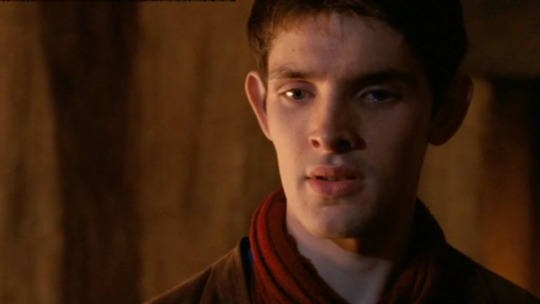
And then we immediately cut to him in his room, awake despite the late hour.
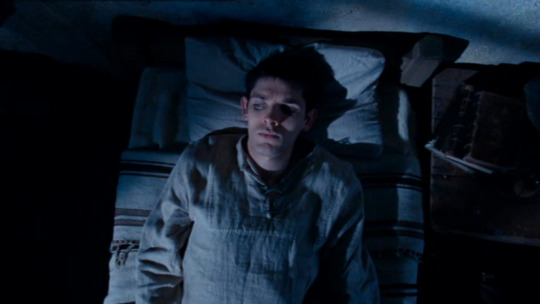
You know, when we talk about losing sleep - when we ask, accusingly, “how do you sleep at night?” - we’re talking about guilt.
Merlin knows; he’s afraid that everything Gilli just said is true. And, thinking back, when we as an audience look back at Season 3, we realize suddenly that we haven’t actually heard much from Merlin this season about how hiding his magic makes him feel conflicted. In contrast to seasons 1 and 2, when his double life is causing him enough pain that he nearly confesses in 1.10 and nearly runs away with Freya in 2.9, in S3, we don’t see him struggle with it outwardly on any kind of regular basis. He’s deluded himself, at least superficially, into becoming comfortable with the lie, into enjoying the life that the lie permits him to lead.
And now that Gilli has confronted him with a dose of truth, the reality of his situation comes rushing back.
Is he really any more in the right than Morgana? What kind of moral high ground can he possibly claim when he allies himself with a king bent on exterminating his own people? What kind of right does he have to criticize other people’s acts of resistance when he’s sitting pretty up in the castle, side by side with his oppressors, while others like him suffer?
He’s been confronted with this question before, and it’s been lingering in the background ever since, ever-present, waiting for the moment when it can’t be ignored anymore:
Are you saying you’d rather keep your magic a secret for Arthur’s sake than use it to protect your friends and family?
and
This isn’t about Arthur, this is about your friends. Are you going to abandon them?
What, like you did?
I’m here now.
Yeah. Yeah, and you could end this. If you used your magic, no one else would have to die.
You know I can’t.
Can’t or won’t? I’m not the one abandoning these people, Merlin. You are.
This is a moral question that has been BEGGING to be asked for three seasons. It is ESSENTIAL and INSEPARABLE from the story the writers are trying to tell, and the fact that they refuse to ask it does a disservice to Merlin’s character arc and makes Morgana’s storyline less satisfying. The story HAS to engage with this issue. Somebody has to ask the question: if Uther dies, so what? Why are people with magic considered acceptable losses as long as he can stay on the throne? What’s he done that’s amazing enough to be worth the deaths of all these innocent people? Why is an oppressed population supposed to just sit and accept their victimization indefinitely and without complaint until Arthur - maybe - comes riding in on a white horse? The story HAS to ask these questions, even if the answers might reveal some uncomfortable moral quandaries/failings on the part of our protagonist - I can’t imagine this show going two more seasons without finally grappling with this issue.
So anyway. This episode was doing an amazing job of starting that process, particularly with that confrontation between Gilli and Merlin. We were going there!
AND THEN THEY PUNKED THE HECK OUT; I CANNOT BELIEVE IT
I don’t know why they backed off at the end of the episode and did that 180 to literally having the dragon say “we have to wait and trust that arthur will give magic-users their freedom” and just...completely dropping every difficult ethics question that the earlier part of the episode asked. I can’t understand why. They’d already nailed it! It was amazing. The character work they were doing was amazing. It was the necessary pivot point, the Third Season Swing. It was setting up the new central question/tension for the next two seasons - the switch from “how do i keep my magic secret” to “how can i JUSTIFY keeping my magic secret?”
Which, the spoiler would have been: he can’t.
But the show backed away from the questions it posed, at least for the remainder of that episode, and all i can do i HOPE that they resurface somewhere in the next two seasons that I haven’t watched yet.
#PLEASE DON'T COME TO ME AND MAKE INDICATIONS ABOUT WHETHER OR NOT THESE QUESTIONS ARE ADDRESSED AGAIN#PLEASE LET ME LIVE MY UNSPOILED LIFE UNTIL I FINISH THE NEXT TWO SEASONS#THANK YOU ALL FOR YOUR PATIENCE I APPRECIATE YOU ALL#all i do is ramble and then tell people not to engage with me i'm sorry y'all#X)#i'll be done soon enough!#the once and future slowburn#meta
17 notes
·
View notes
Link
“There’s never been a society that hasn’t had a clock running on it,” declares a character in Arthur Miller’s play The American Clock, “and you can’t help wondering – how long? How long will they stand for this?” Whether time is running out is a question on many people’s minds today on both sides of the Atlantic, whether they’re watching the “Brexit clock” tick or wondering how long the Trump presidency will endure. The American Clock is set during the 1930s but was written in 1980, as Miller watched America’s headlong race back into the gleeful, reckless greed that dominated the 1920s and led to the Great Depression, and it’s one of several of Miller’s plays that are being revived in London. Clearly that sense of timeliness, in every sense, is mounting.
In addition to The American Clock, this year will bring a new production of The Price with David Suchet to the Wyndham’s Theatre, Sally Field and Bill Pullman will star in All My Sons at the Old Vic, The Crucible will be mounted at the Yard with a female-led cast (including a woman playing the hero, John Proctor), and an almost entirely black cast will revive Death of a Salesman at the Young Vic. Miller’s plays are emblematic, representative: they are often set at moments of national crisis, whether the Depression, the Second World War or the Salem witch trials, as the conflicts of the characters symbolise epochal conflicts in American life. Read them together and you start to get a sense of a nation in a constant state of crisis.
Miller called The American Clock a “mural for theatre”, evoking the agitprop social murals of the 1930s, with a large ensemble representing all of the United States, presenting vignettes that shift and adapt across geography and time. One character picks up another’s narration, finishes another’s line. The stories are the interconnected experiences of a nation struggling to survive, as Miller attempts to render a “mythopoetic” vision of America that might be sufficient to its mythopoeic vision of itself, a nation of shared values and impulses, despite its differences.
The American Clock suggests that out of chaos can come new possibilities, an idea that many people with whom Miller would have had little sympathy are today banking on (again, in every sense). Miller rejected both socialism and fascism as too rigid and extremist; like most of his work, The American Clock suggests that a healthy society needs to find a balance between individual and collective needs. He would have had no truck with disaster socialism or disaster capitalism, but these are still possibilities the play leaves open.
Miller shows a cross-section, a collage, of Americans across the nation and the social spectrum struggling to achieve a balance between the two, in order to emerge from the catastrophe of the Depression – which Miller characterised in his autobiography, Timebends, as “only incidentally a matter of money. Rather it was a moral catastrophe, a violent revelation of the hypocrisies behind the facade of American society.” The ending of The American Clock is ambivalent about whether social renewal is possible, but understands that belief in American renewal is itself central to American renewal. Optimism becomes the only faith system that matters: hope as ideology, a communal identity defined by collective self-belief.
There are good reasons why Miller is enjoying a renaissance this year: not only was he always a political writer, but his political questions align firmly with our zeitgeist. Miller wrote about the individual’s responsibility to society – but also about society’s responsibility to the individual. He challenged the key myths of American culture, broadly incorporated in the familiar ideas of the American dream, including materialism, self-sufficiency and selfishness, but also blind faith in the lotteries of rags-to-riches stories and the redemptive individual. Miller’s work consistently turns to themes of individual and community, trying to come together to rise above chaos but often stymied by the failings of those individuals.
****
Arthur Miller was born in New York in 1915, when Harlem was a mixed neighbourhood of German, Italian and Jewish immigrants, into which black Americans were moving as they left the South in search of opportunity. His father Isidore, who had immigrated from Poland, had built up a large and prosperous clothing business, but when Arthur was 14, it all came crashing down along with Wall Street. The business failed and the family descended the economic ladder. The effects of the Depression shaped not only Miller’s adolescence but his moral and political imagination – and the rest of his life. “I don’t think America ever got over the Depression,” he later said.
Whatever the truth of that may be, certainly Arthur Miller never got over it. He chose theatre, he said, although he had little experience of it even as an audience member, because “you could talk directly to an audience and radicalise the people”. That didactic impulse never entirely left him, but it swiftly acquired greater subtlety.
Miller’s first play, The Man Who Had All the Luck, closed in 1944 after just four days. Three years later, he found his first success, All My Sons, followed two years after that by Death of a Salesman, still the play for which Miller is best known. In 1953, he produced The Crucible, using the Salem witch trials of 1692 as an analogy for the witch hunts of McCarthyist America; the hat-trick clinched his status as one of America’s major playwrights of the 20th century.
Two years later Miller himself was subpoenaed by the House Committee on Un-American Activities and publicly defied them. He had begun (improbably, it was felt) dating Marilyn Monroe, who threw the weight of her popularity behind Miller as he resisted the committee’s pressure. At a press conference he announced simultaneously that he would not co-operate and that he and Monroe were engaged. Having refused to plead the fifth amendment, which protects a witness from self-incrimination (and is thus often viewed as a morally evasive choice at best), Miller was charged with contempt of court. His marriage to Monroe was complex and controversial, and for many years after her death in 1962, continued to define his public reputation – not least because of his 1964 play After the Fall, widely condemned at the time as an exercise in self-exculpation.
But culpability was always one of Miller’s themes, to which he returned in later life as the chaos attending a highly public marriage to a movie star, followed by her early death, subsided. Themes of guilt and complicity run through most of his plays as a counterweight to myths of American innocence and optimism: people don’t just betray each other, they betray themselves and their own ideals.
Each of these great plays is driven by their protagonist’s powerful need to believe in their innocence; their acceptance of guilt and collective responsibility is tragic but redemptive – except for Willy Loman, who can never be brought to see his own self-deceptions. They destroy him, and it is left for those wrestling with his legacy to insist that “attention must be paid” to such a man. But all three men at the centre of these plays are destroyed, in different ways, by the shame they feel for their choices, by their self-righteous efforts to justify themselves and the inevitable failures of those self-justifications. This makes denial another constant theme, one that Miller watches play out on personal levels to suggest the ways it operates nationally as well.
****
The structure of a play,” Miller liked to say, “is always the story of how the birds came home to roost.” His best plays open at the beginning of aftermath: they are, from one perspective, all denouement. At the start of All My Sons, Joe Keller has already committed the betrayal – selling bad plane parts to the military – that would more traditionally have been the climax of a different play about Keller’s conflicted decisions. Here, the drama is psychological: Keller and his family must come to terms with the choices he has already made.
Similarly, in Death of a Salesman, Willy Loman has already failed: his death merely makes manifest the moral and psychological death he suffered before the action began. In The Crucible, the affair of John Proctor and Abigail Williams that provokes the dramatic action is already over when the play begins. Drama is not cause, but effect. This also gradually brings the past into the present – a technique Miller learned from Henrik Ibsen – showing that even national history is really just the history of personal choices. Climax is confrontation: confrontations with truth, with personal repercussions and moral ramifications.
Miller’s imagination ran towards the epic and the heroic, apparently insignificant lives embodying significant themes; a certain tendency towards grandiosity was usually checked by the smallness of the lives he explored. Willy Loman’s ordinariness is what makes his claims to tragic heroism in The Death of a Salesman remarkable, rather than sentimental showboating, whereas John Proctor’s place in history risks making his martyrdom in The Crucible overblown. Loman’s tragedy is that he has worked hard, and cannot understand why there have been no rewards; on the contrary, there has been only failure. Like so many Americans today who feel “left behind”, Loman is the representative American who can’t understand why the dream has passed him by.
Although The Death of a Salesman is usually read as a broadside against “the American dream”, it is attacking only a cheapened version of the dream, one that postwar America was busily selling itself: condemnation of a society allowing its aspirational political ideals to deteriorate into justifications of selfish materialism. Miller gave the play a telling subtitle: “Certain private conversations in two acts and a requiem.” It is a requiem less for Loman than for the American dream itself: the degraded dream Loman desires is the corruption of an older, more generous one – ideals of mutual responsibility and opportunity, rather than a simple, deluded faith in the idea that “free enterprise” alone could build an exemplary society. That dream is represented in the play by Willy’s neighbours, Charley and his son Bernard, whose prosperity and stability are set in relief against the Lomans’ psychological and financial precarity. Charley and Bernard represent American meritocracy, for they are also honest, hard-working and compassionate. Bernard’s profession as a lawyer reflects their sense of civic responsibility, symbolising democratic ideals of justice and equality under the law.
Loman’s profession as salesman is just as symbolic of the debased dream he chases: the empty dreams of wealth and status that were engrossing mid-century America in every sense, turning it into a nation of salesmen peddling meretricious kitsch.
The Death of a Salesman was written just as the postwar boom began, as America enjoyed a new prosperity – thanks largely to government investment in programmes such as the GI Bill, which sent millions of returning soldiers to university, and the Federal Housing Administration’s loans, which created housing opportunities like Levittown, celebrated at the time as the American dream made real.
Such government loans gave a man named Fred Trump his start in the property business during the 1940s, when he borrowed sums he was later forced to concede before a congressional inquiry had been “wildly” inflated. He used these inflated loans to develop housing projects that became the foundation of the Trump Organization, which would be sued for racial discrimination by the US Department of Justice in 1973, two years after Fred’s son Donald took over the business. The story of Death of a Salesman is that of a nation running a real risk of moral collapse – of becoming a country of con men.
The story that inspired All My Sons was true. The corruption of American ideals is Miller’s perennial subject, the failures of his “everyman” figures to live up to the values their nation espouses – and thus, by extension, the nation’s failure to do the same. The American tragedy, he suggests, is the human tragedy: the story of people who sell out in every sense.
Willy Loman cannot accept that his values were misplaced; he dies rather than face the hollowness of his own life. Both All My Sons and The Price, by contrast, are plays about living with the feeling of having sold out and the costs of the choices we make. Materialism faces off against idealism once more – but now materialism has a more cynical feel. Loman’s tragedy is less bad faith than having put his faith in a bad bargain. Walter and Victor in The Price, selling off their dead parents’ belongings, are less deluded; they are wrestling with the unintended consequences of their own ordinary choices. They gradually pull down each other’s self-righteous justifications, learning the price of being oneself, while Miller suggests the price of a society that allows its morals to be shaped by economics, for a country that offers “no respect for anything but money”.
In his autobiography, Miller wrote that he hoped the audience would leave The American Clock with “a renewed awareness of the American’s improvisational strength… In a word, the feel of the energy of a democracy.” Can energetic improvisation create a collectivity that overcomes division? It’s tempting to answer with the words of another great American writer and say that it’s pretty to think so.
But cynicism was, for Miller, part of the malaise he seeks to redress: America is not America without its idealism. That said, his dramas end with tragedy, not transcendence. And his tragic heroes are not usually hubristic; their flaws are more ordinary, more sordid. They are men who seek exculpation – but culpability, Miller suggests, is the human condition, the original sin. Character may be destiny – but character is also choice. We are what we do, we are what we choose – and this goes for the societies we create, too, while we watch and wonder if the clock is running down. ...”
3 notes
·
View notes